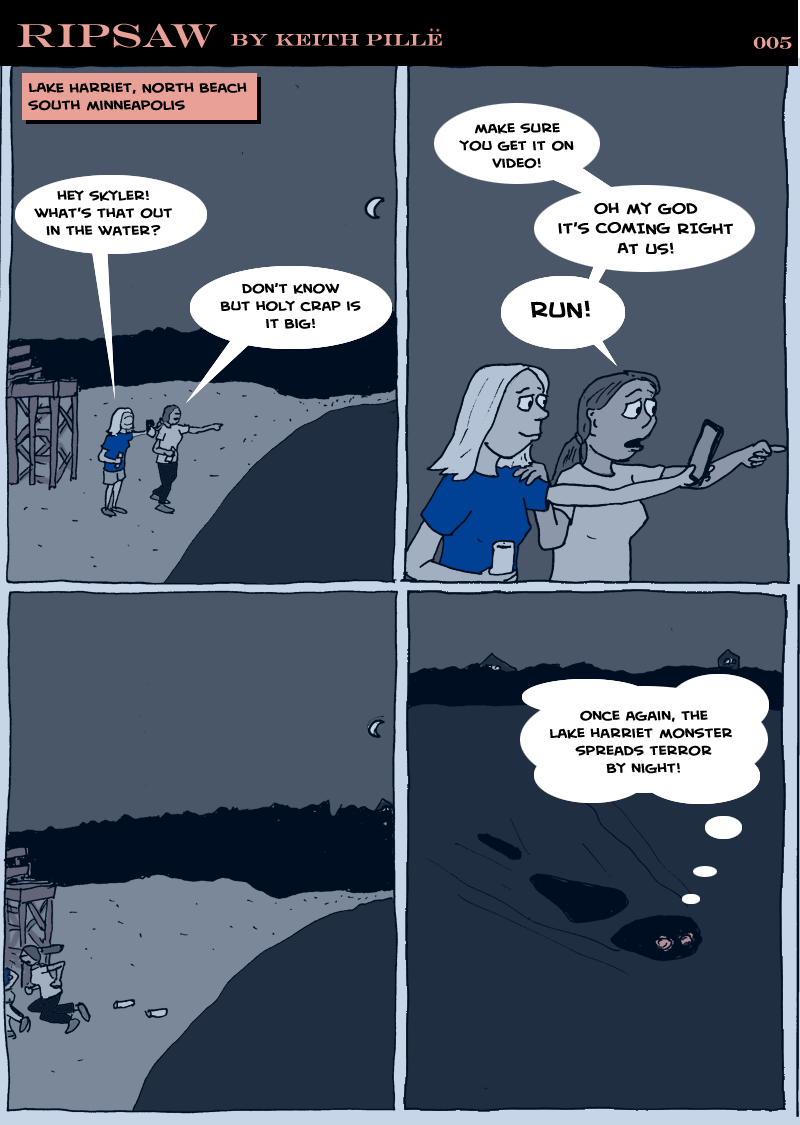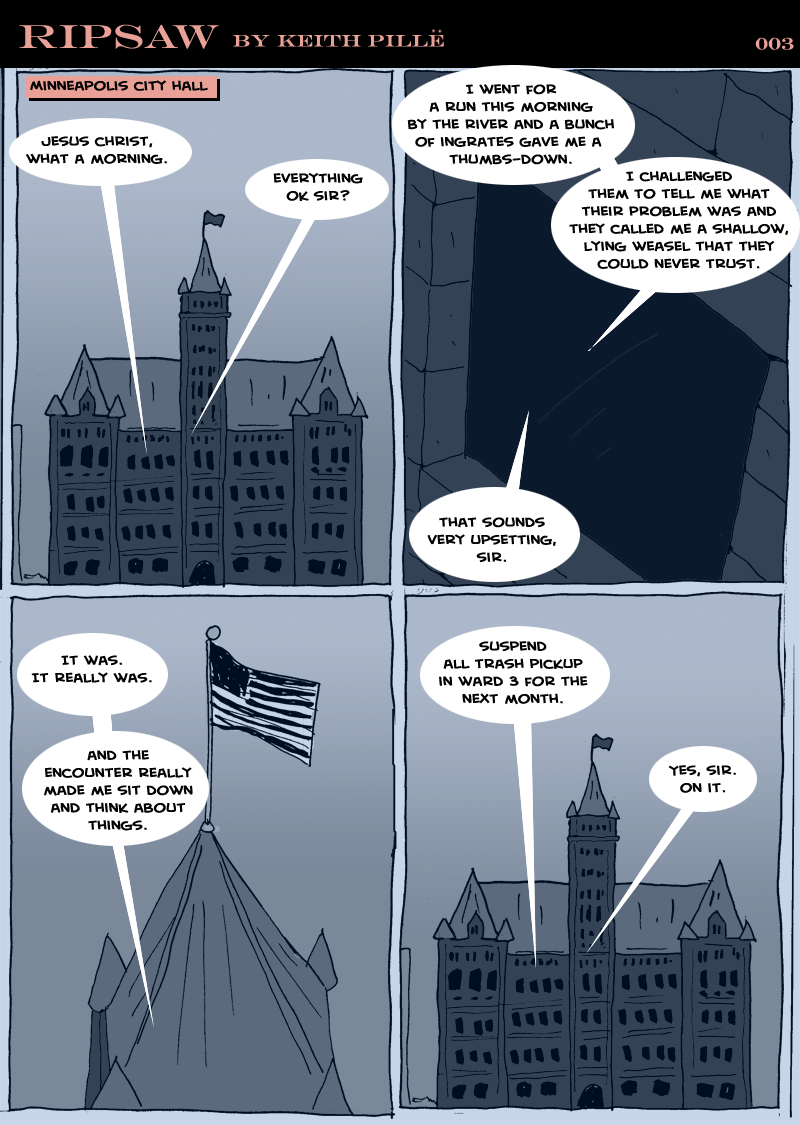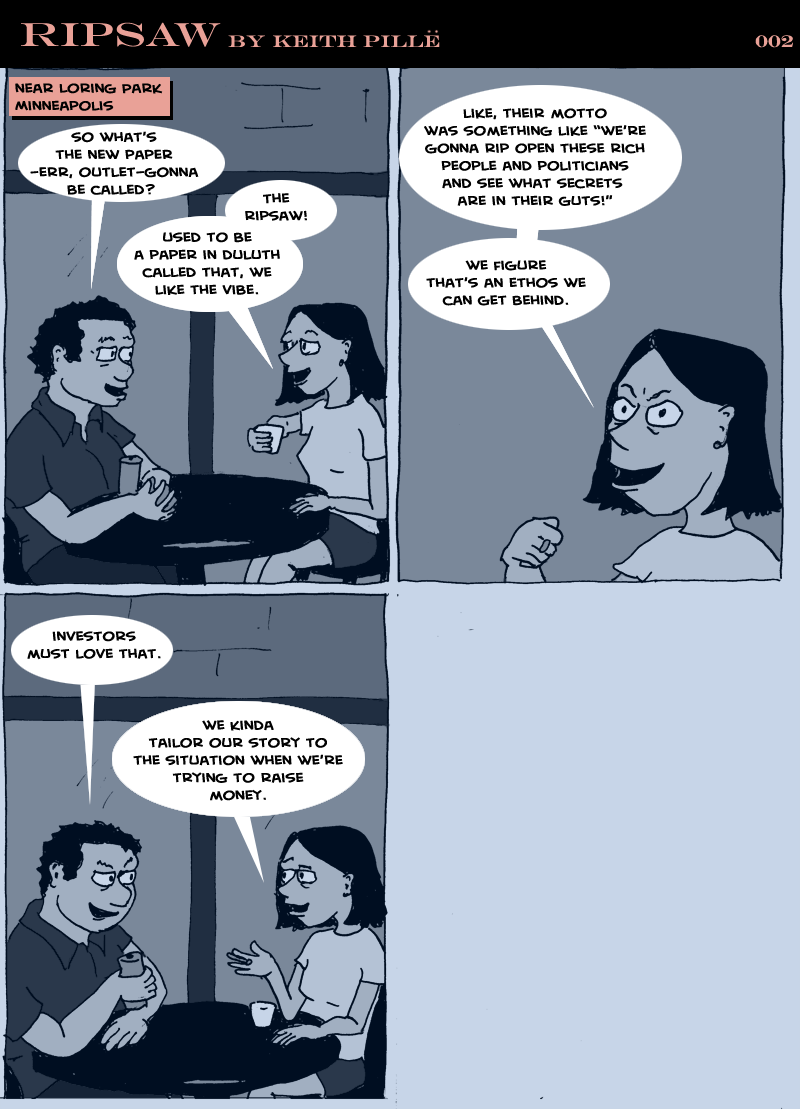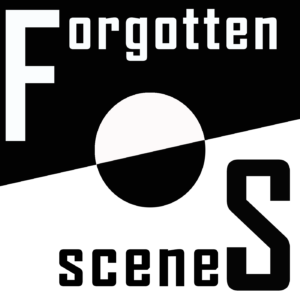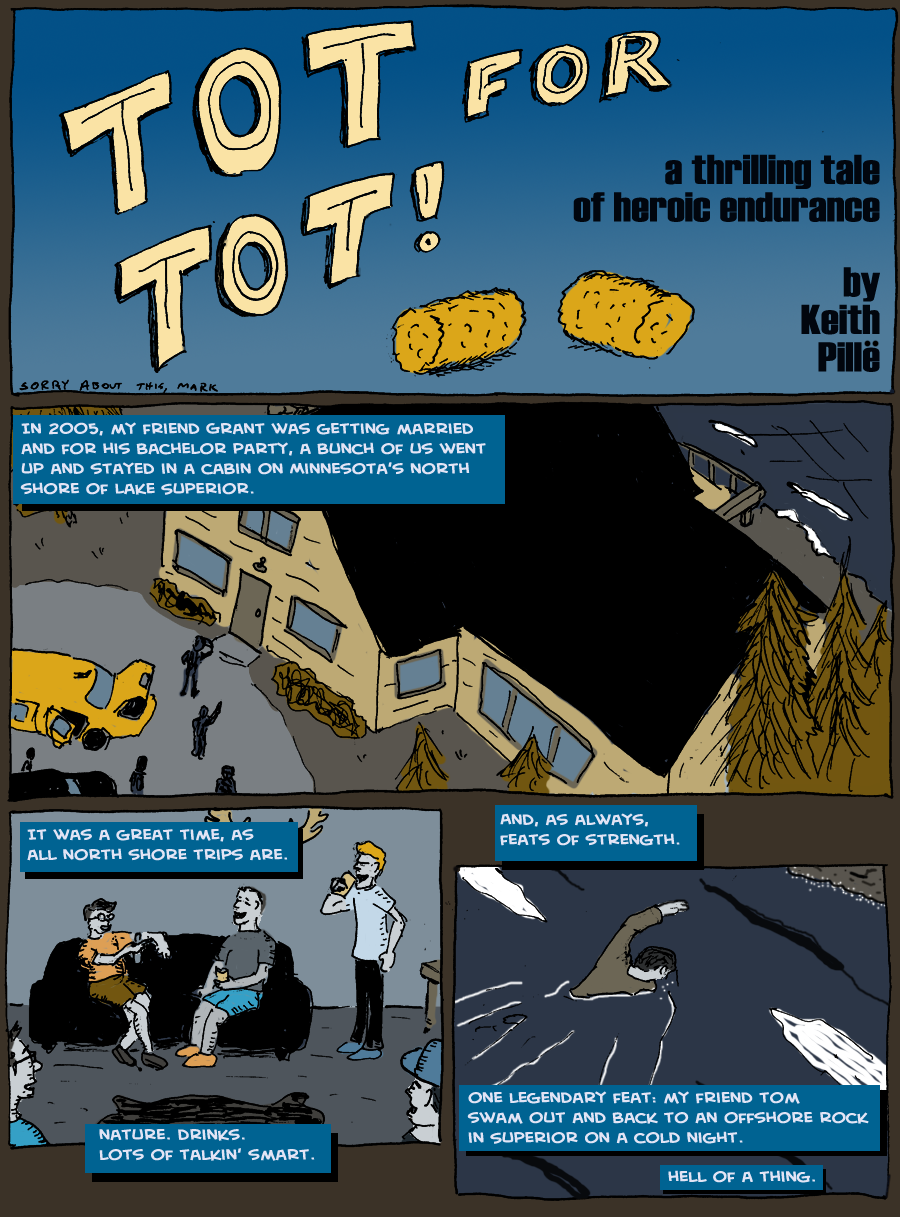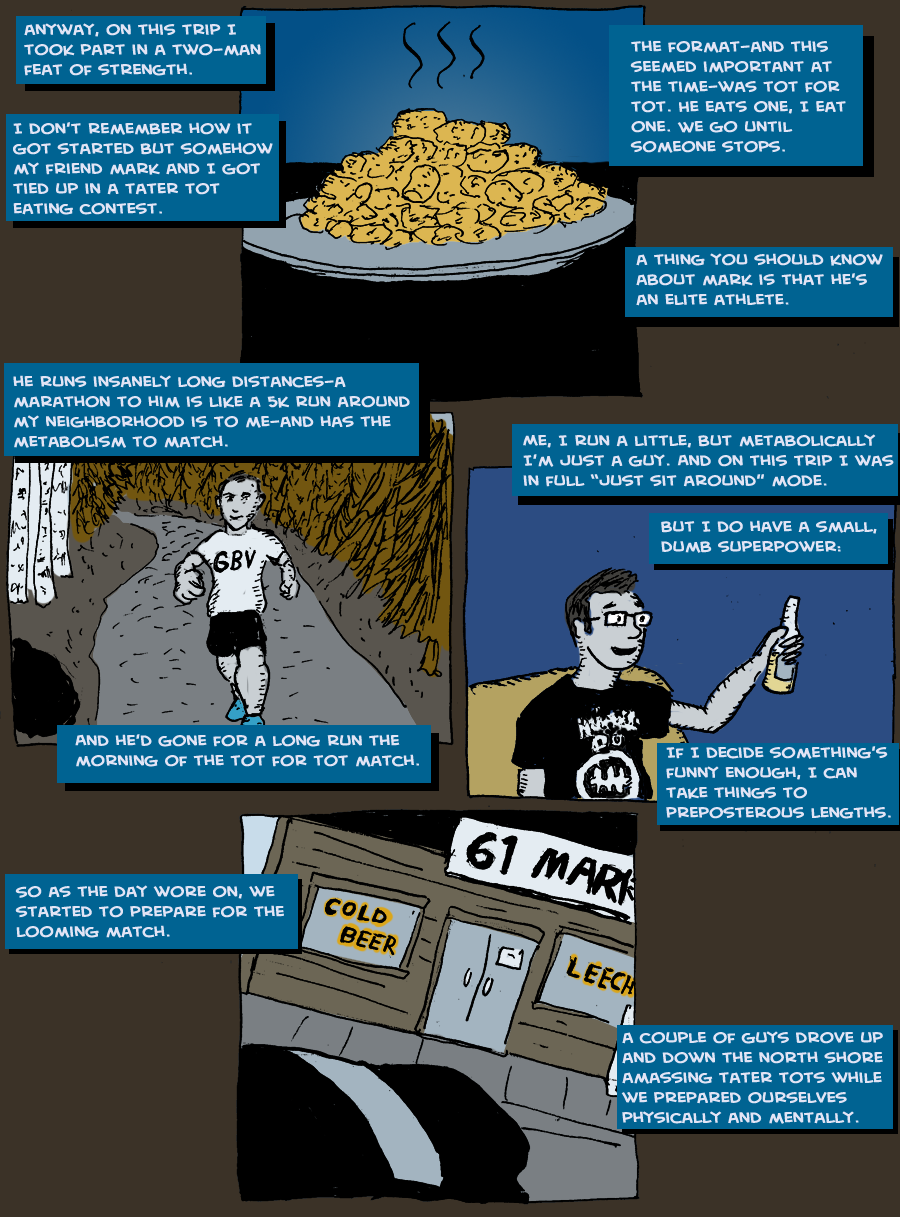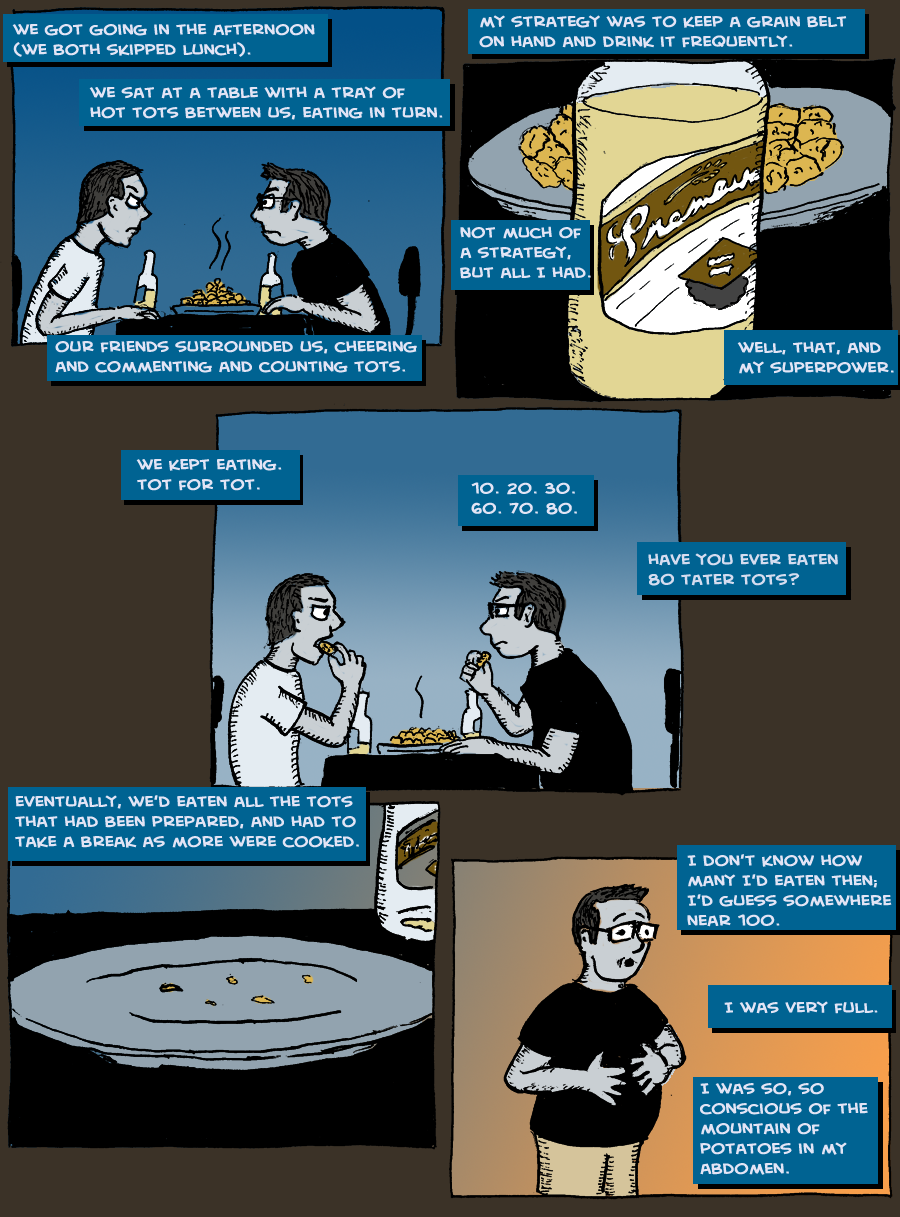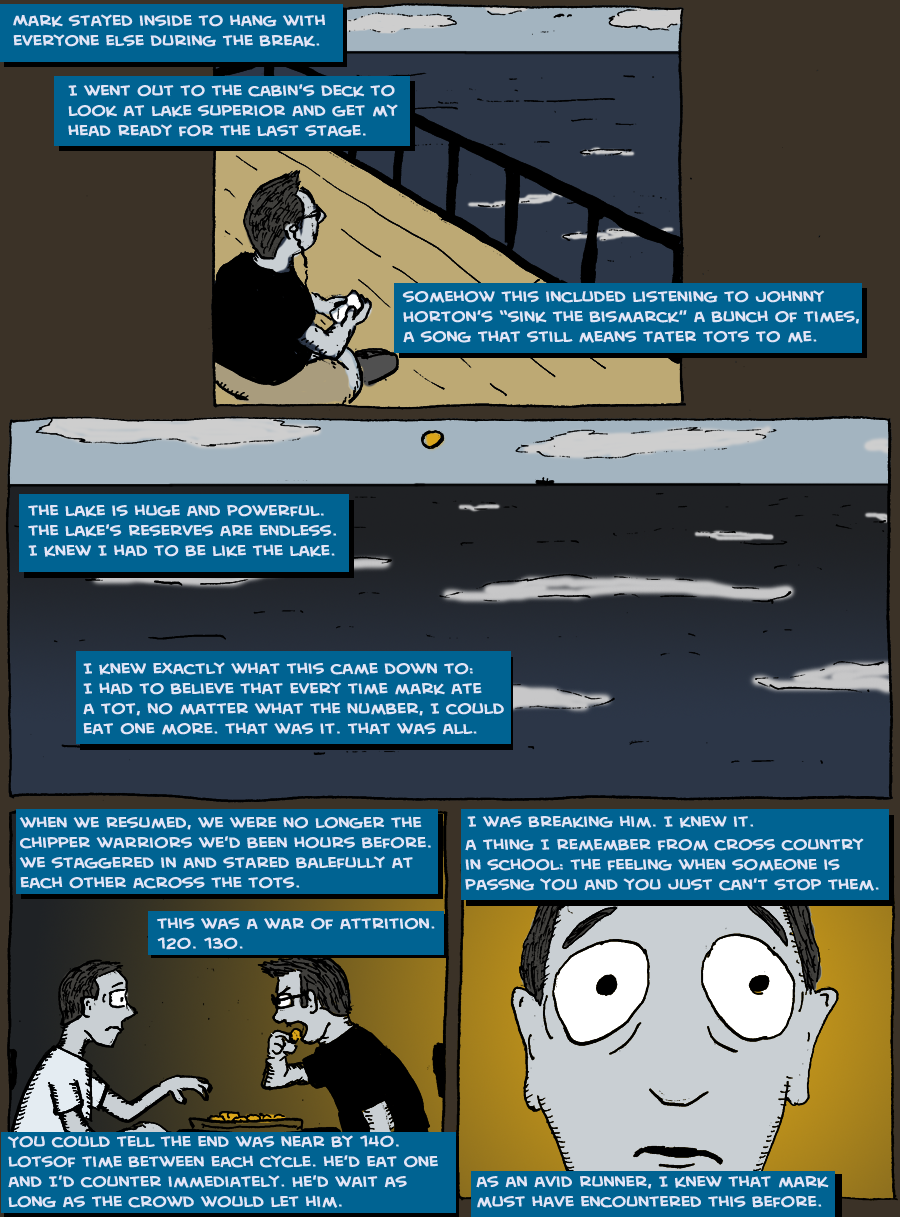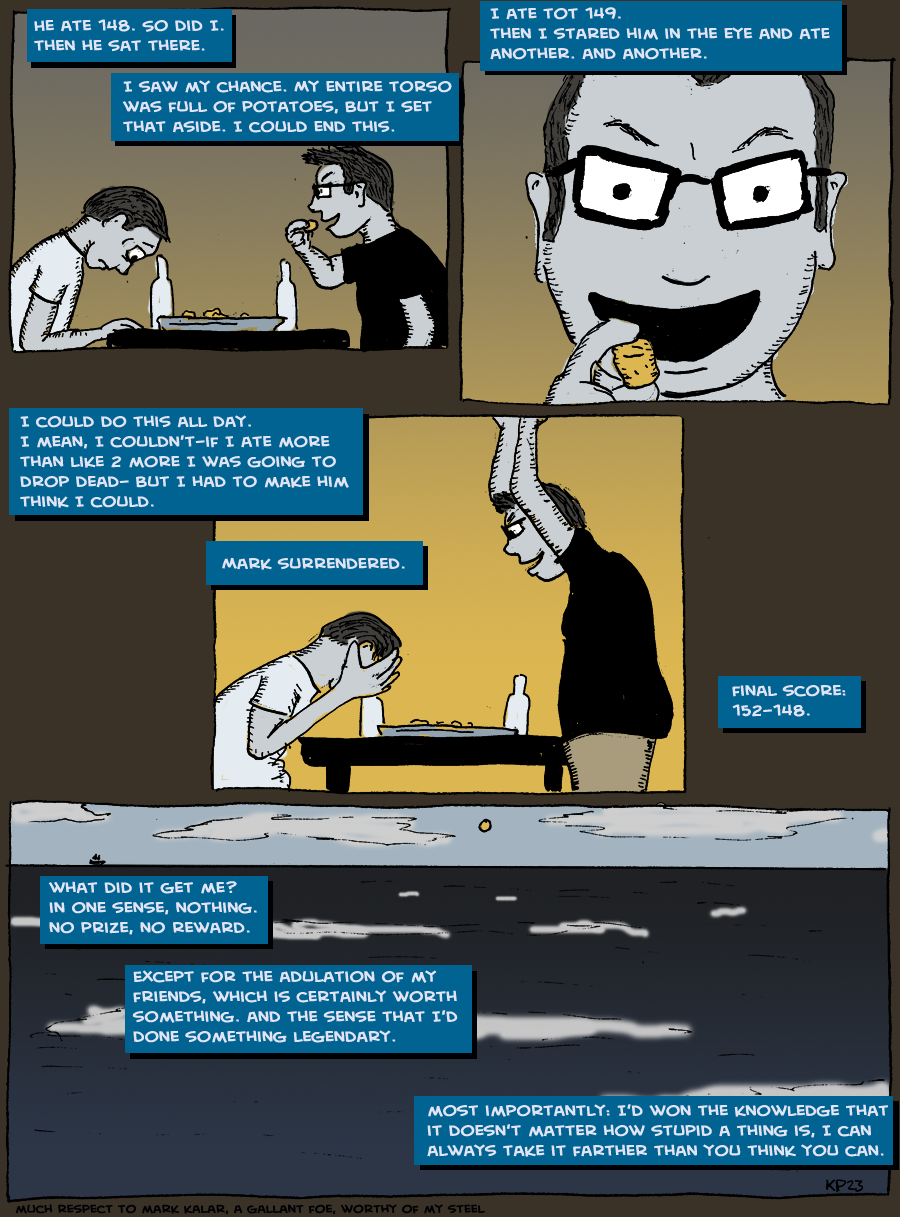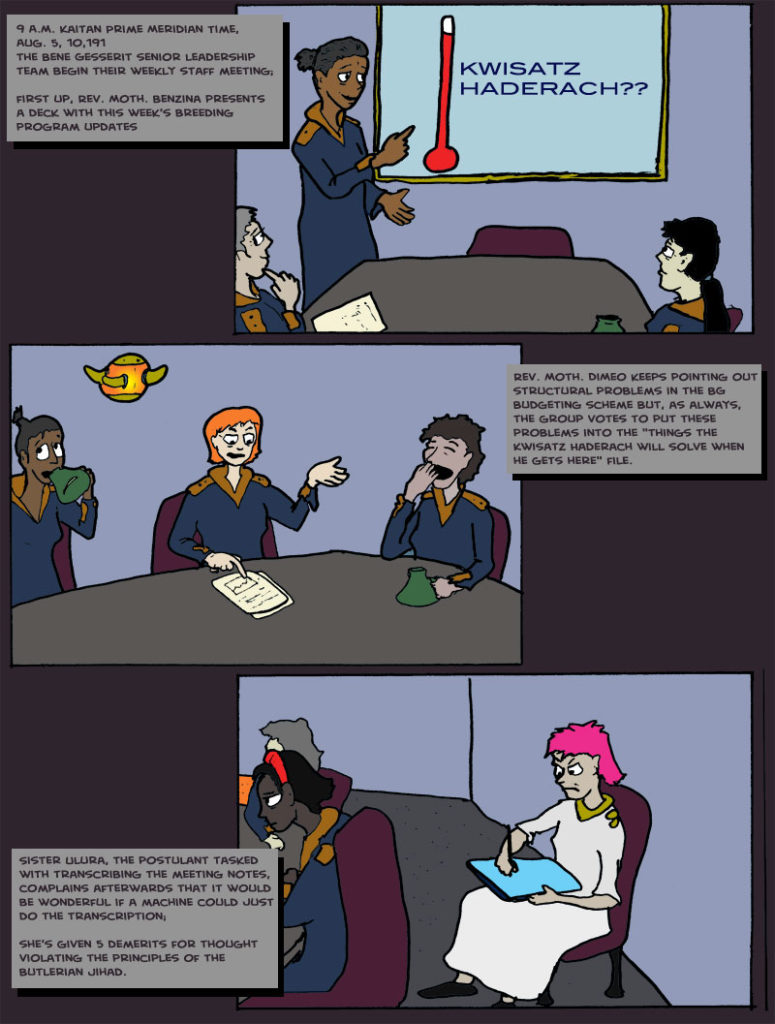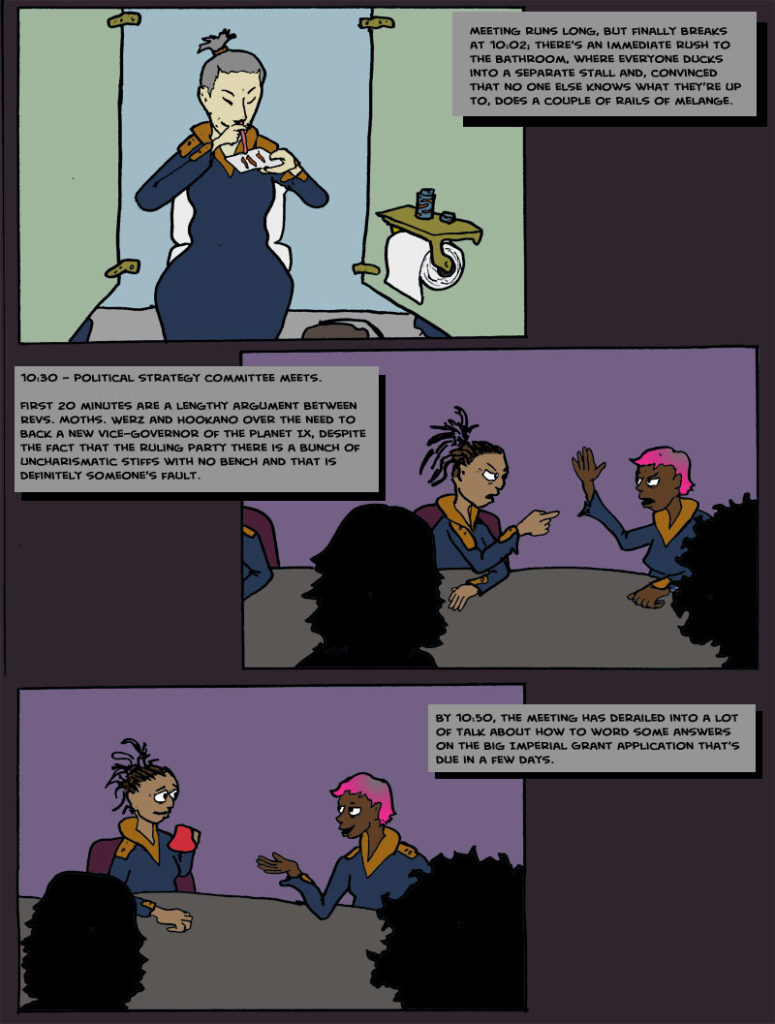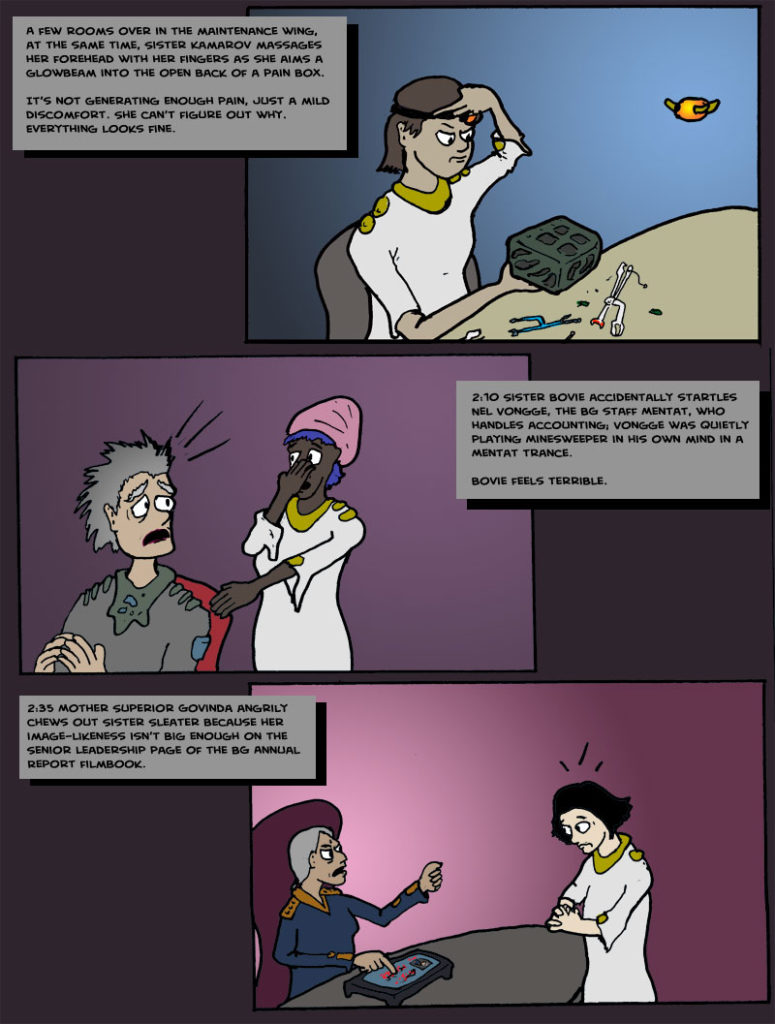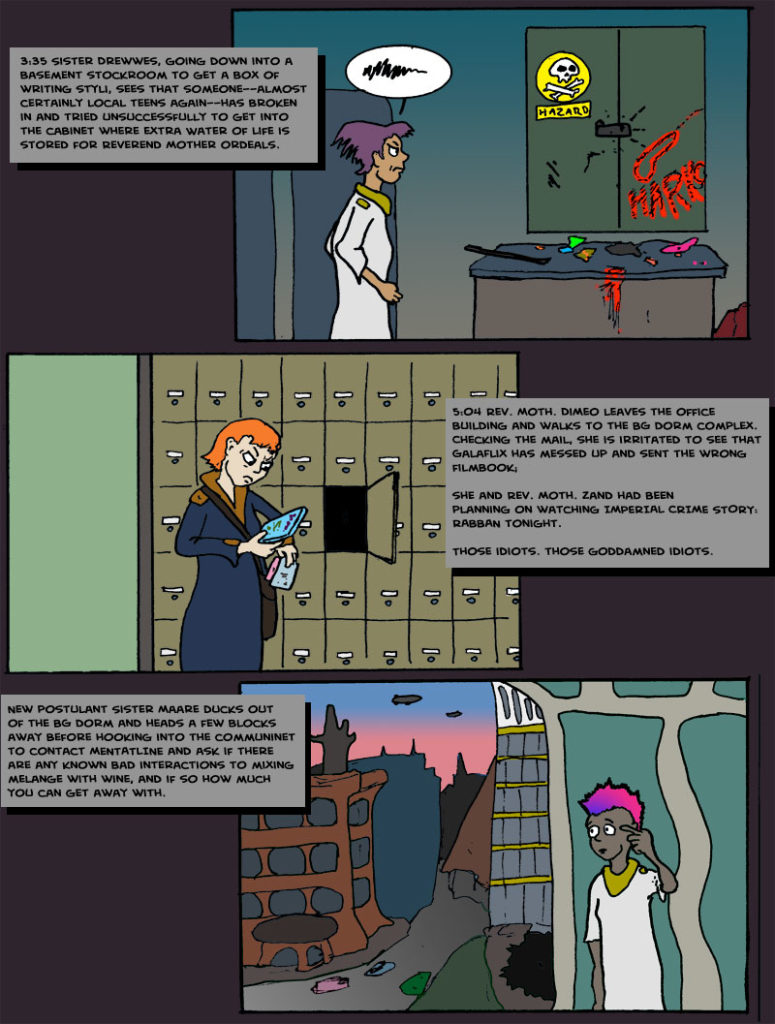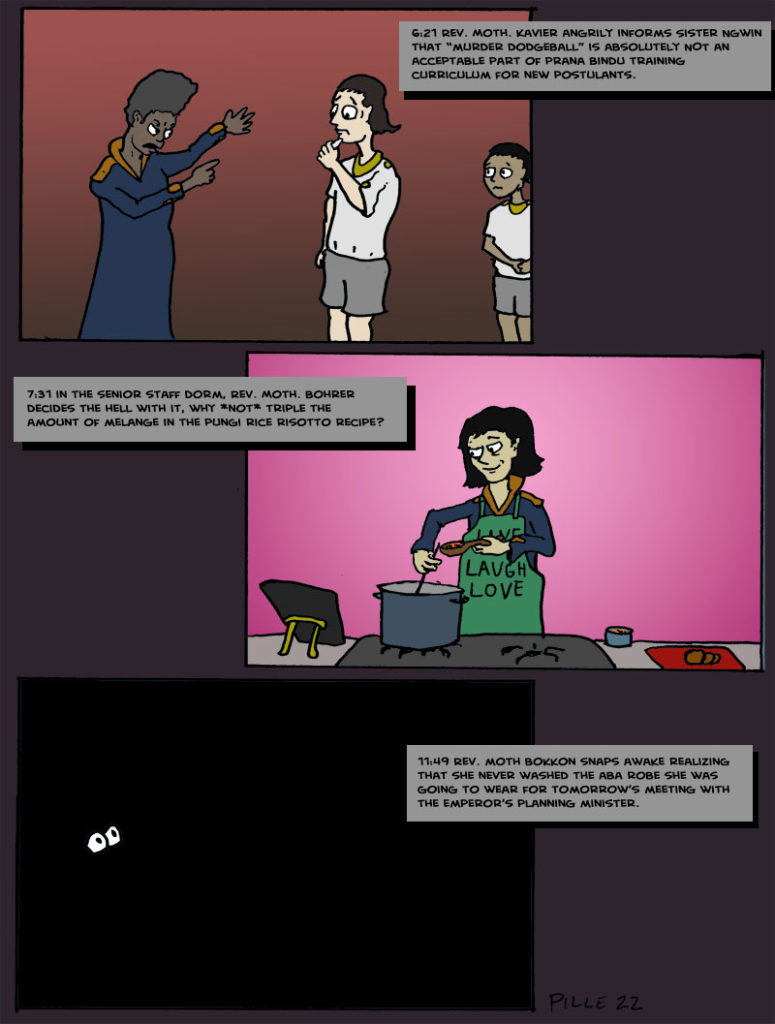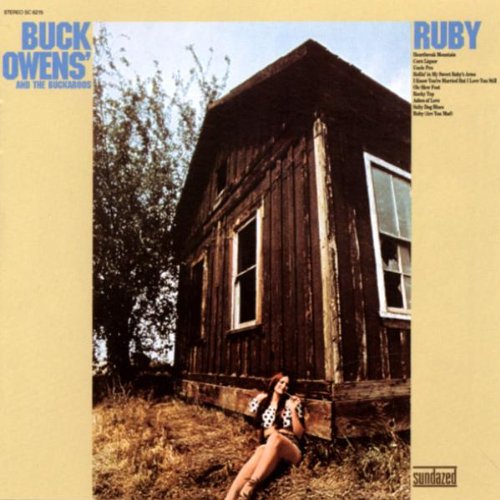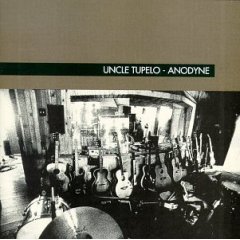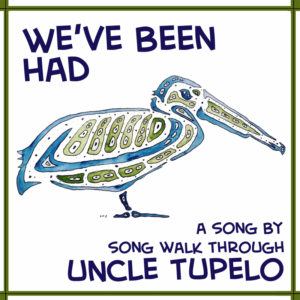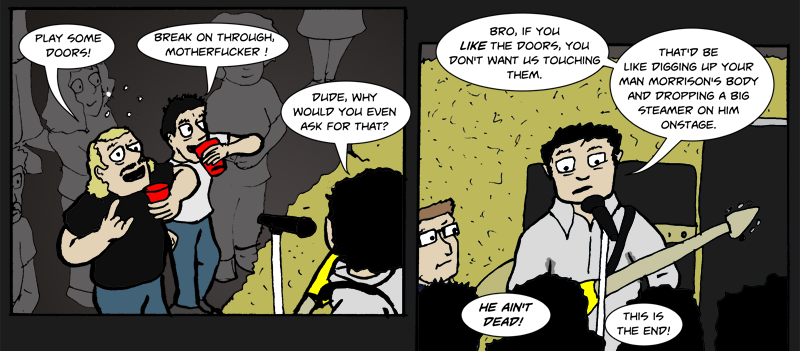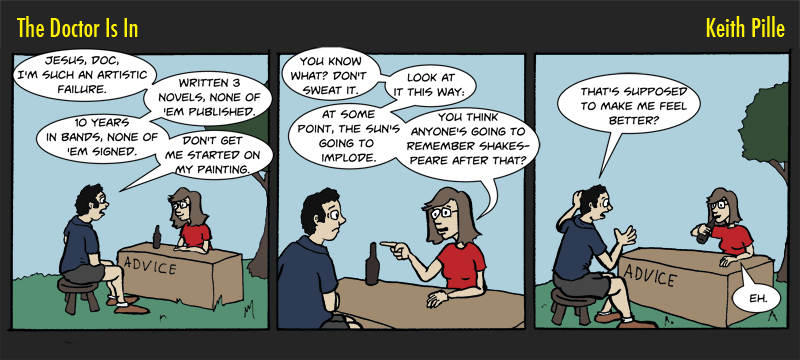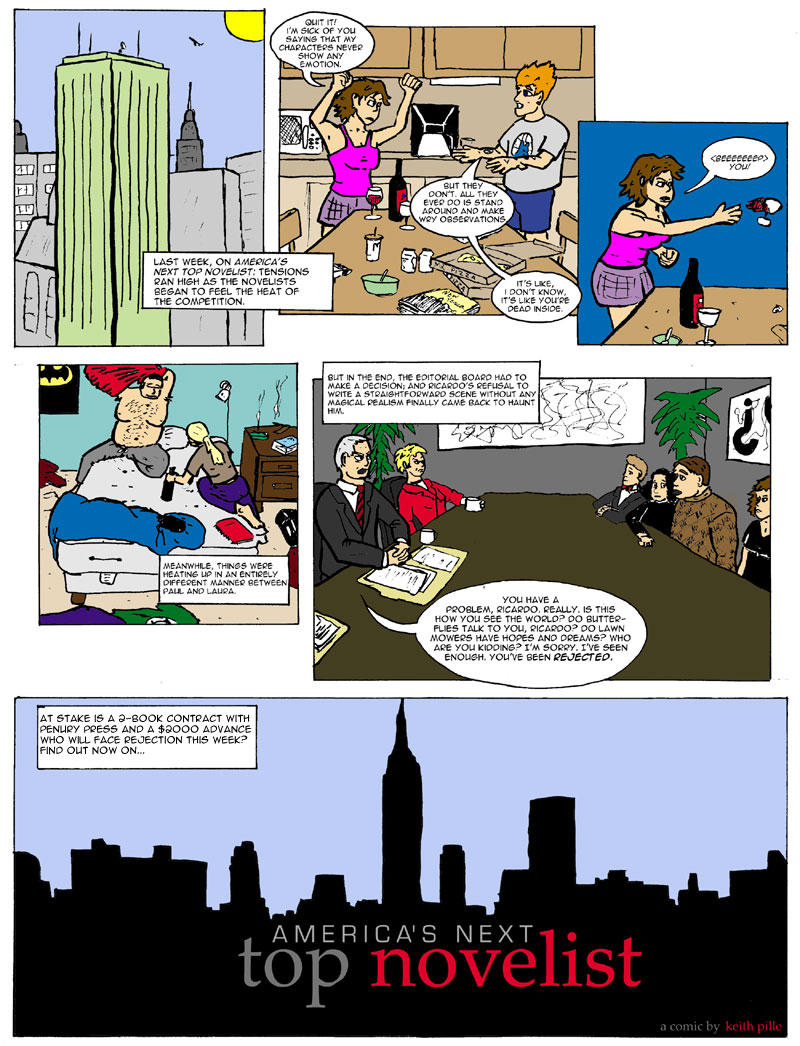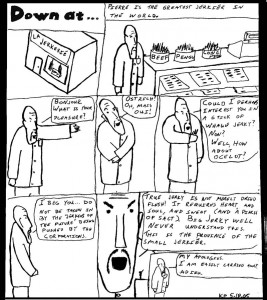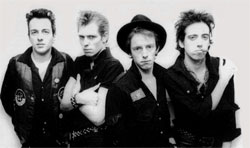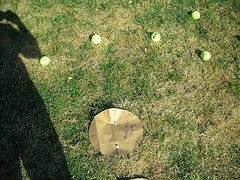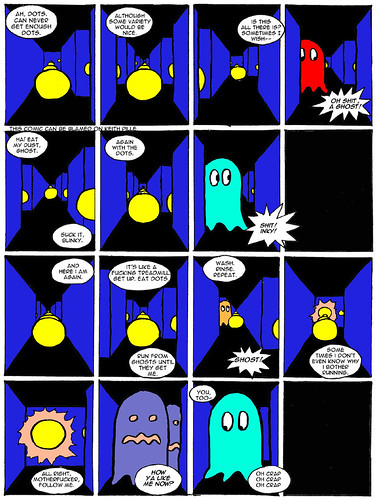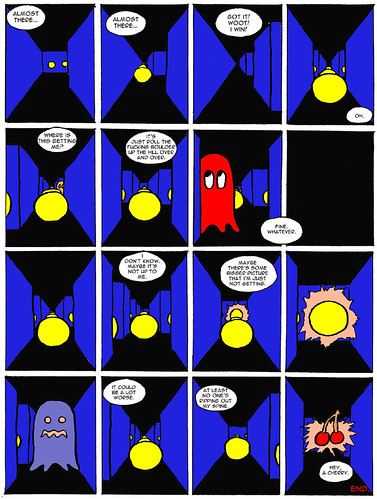
Ripsaw 005
Ripsaw 004
Ripsaw 003
Ripsaw 002
Ripsaw 001
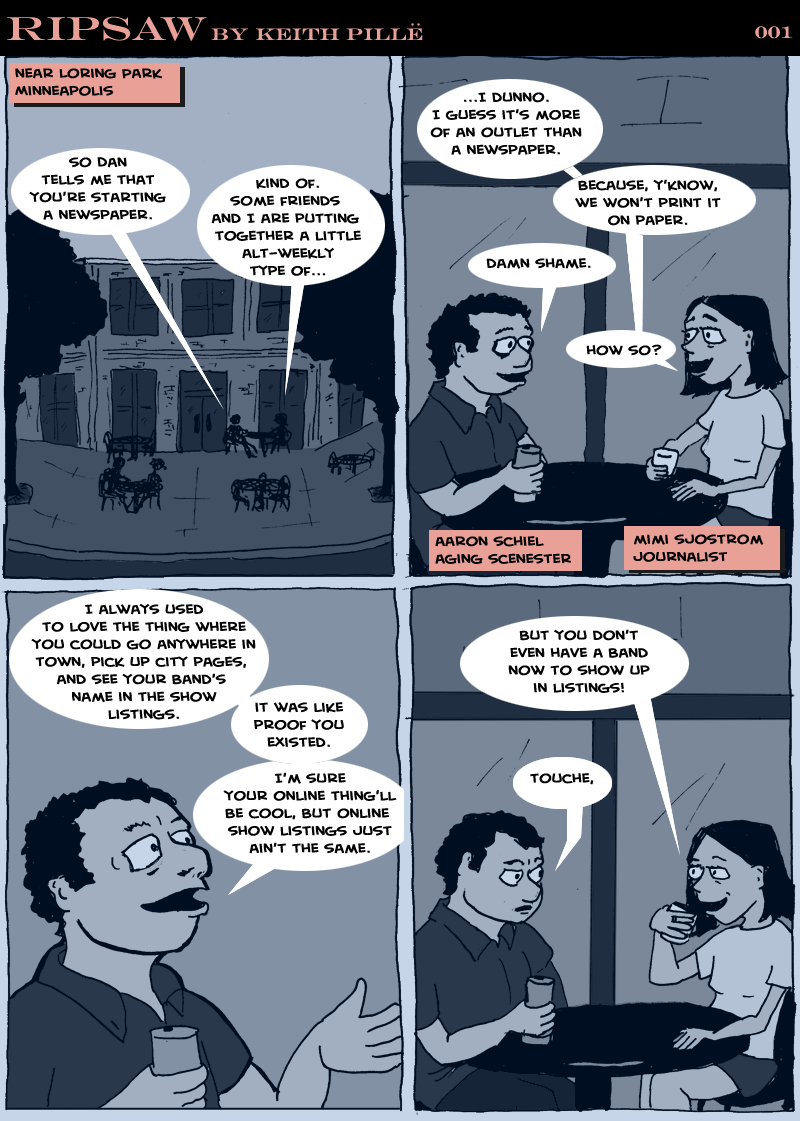
Holy shit! A brand new webcomic era begins! You might recognize these two characters from Nowhere Band; don’t worry, you don’t need to read back issues to get what they’re up to, and there are plenty of new characters coming.
Announcing Forgotten Scenes
So I’ve started another fake history podcast! After two seasons of fake military history in The Kraken Busters, I thought it might make sense to switch back into my proper lane and do some fake cultural history. So: I’d like to introduce you to Forgotten Scenes, a show where I look at little cultural supernovas that might or might not have existed.
The first season is called “The Freaks in the Barn,” and it chronicles a little psychedelic glam rock scene that exploded (or didn’t) after David Bowie was (or wasn’t) briefly stranded in Sioux City, Iowa, in 1972 and infected a bunch of local weirdos with the idea of glam rock. Aside from Bowie, you get to meet a Texas-wannabe car dealership heir, a woman who might’ve accidentally summoned the devil to a rock show, and a hardline prairie-Maoist proto-punk band.
The show’s a ton of fun, and should be findable at all of the usual podcast outlets. I’ll also try to aggregate episodes here as they go live (which should happen once a week while the season’s running).
Tot for Tot
Monday at Bene Gesserit HQ
The Kraken Busters
THE KRAKEN BUSTERS is a new podcast project I have going, telling the story of the somehow-mostly-forgotten conflict between the United States and an ocean full of angry sea monsters just after World War 2.
If you like Mike Duncan and Dan Carlin but wish their work had more giant squids and octopi, well, this is the show for you.
New episodes come out weekly. You can find the show at all of the usual podcast outlets, or stream it directly from the site.
I’ll Be Comin’ Around
Disc 2 Track 3
I’ve said before in this series that one of the enduring questions with the Bottle Rockets is “is Henneman singing from his own point of view, or voicing a character?” And that, if it’s his own POV, the stretch when the songs for the Rockets’ first two albums were written must have been a really weird time in his life.
Because once again, “I’ll Be Comin’ Around” is essentially a song about being horny; the speaker’s propositioning someone who’s partnered up, and saying that he is 1000% OK with any relationship configuration that gets him in the (back) door. I was going to reproduce a couple of verses, but it turns out that these are in fact *all* of the words to the song:
If he ever changes him mind
Thinks of leaving you behind
Or if you just want something more
When he steps out the front door
I’ll be coming around
Knocking your backdoor down
I’ll be coming around
Knocking your back door down
If he ever breaks your heart
Decides he wants to make a new start
Or if you just want to be vile
When he steps out for awhile
The speaker’s ready to get together if the target’s partner strays, or is up for whatever “if you just want to be vile.”
The weird thing is that this song that exists in the shadow of at least two different flavors of infidelity (one of them self-described as “vile”) somehow comes across as really wholesome, partly on the basis of Henneman’s gleeful deliver and partly on the basis of the relentlessly cheerful major-key musical arrangement. Wordless sections dominate vocal sections, including a repeated bridge that ticks along like a cheerful machine.
The tension makes the song; if the Rockets are usually very good at pairing form and content, setting them at odds here kicks the song into an interesting psychological space and makes you somehow low-key root for the vile homewrecker. There’s a lot of infidelity in country music, but it isn’t usually this cheerful.
The extent to which “knocking your back door down” is a euphemism is, I guess, up to the filthy-mindedness of a particular listener.
Gravity Fails
Disc 2 Track 2
If The Brooklyn Side is essentially The Bottle Rockets with somewhat better production values, the pattern holds here. Contemplative acoustic opener gives way to big electric bar-band rocker (just a touch more polished this time).
“Gravity Fails” (note that Spotify misnames the song as “Gravity Falls,” which I’ll take as emblematic of the general way the Bottle Rockets don’t get the respect they deserve) is not a great song, in the sense that it doesn’t have anything profound to say about the human condition, but it’s a lot of fun and it rocks the house. As is often the case, the Bottle Rockets are here to examine the mind of a man trapped by his own desire to wander. It doesn’t quite have the chainsaw guitar of “Gas Girl,” its counterpart on the first album, but it’s got a driving beat and Henneman sells a lot of very convincing urgency with his voice. You know you’re an expert as using your voice to its full effect when you can deliver
Baby I’m saying please, please, please
Down on my baby blue blue jeans
Maybe it’s something in my genes
Maybe it’s something in my jeans
and have it land. A quatrain like that could be dire in the hands of a novice, but that last line still brings a surprised smile to my face every time I hear it, after nearly 30 years of listening to this album.
Uncharacteristically, it opens with an instrumental riff that the song returns to periodically, establishing the mood of minor-key urgency that dominates; there’s a tension between this and the bright major-key shimmer of Henneman’s guitar solo in the middle. I’m not sure exactly what the thought process behind this must have been, but it gives the song texture.
Again, not one of the great songs of all time, but a really enjoyable little gem showing how fun the Bottle Rockets could be in their standard Best Possible Bar Band mode.
For the Record: Ruby & Other Bluegrass Specials, Buck Owens (1971)
For the Record is an ongoing (I hope) series where I write a bit about albums that I have strong feelings about, good or bad.
Bluegrass is a weirdly bifurcated world. There’s a joy to the music; even when the lyrics are about heartbreak, misfortune, or murder, it’s impossible to feel too bad when you’re hearing fast picking and high harmonies. But there’s also a joylessness to the milieu out of which the music comes; no area of country music (or, indeed, of music in general, in my personal experience) is as hidebound and hung up on following the rules and doing it the way it’s always been done as bluegrass is. I know from direct experience that musicians-looking-for-musicians listings involving bluegrass will be the most prescriptive out there, and that to even think about getting into a bluegrass band is to run a serious risk of spending half your time bogged down in arguments about the right way to play bluegrass.
Which is part of why Buck Owens’ Ruby & Other Bluegrass Specials is such a goddamned miracle. It’s an experimental, bordering on trippy, take on bluegrass that actually does take the music to strange new places.
Continue reading For the Record: Ruby & Other Bluegrass Specials, Buck Owens (1971)Digging into Achewood
Quick note: this originally ran as two separate-but-related articles at the late, lamented Comics MNT. Alas, nothing is permanent on the internet; but I like these pieces too much to let them succumb to link rot. So here they are, together at last!
1. The Complicated, Slightly Better Manhood of Achewood
Remember Chris Onstad’s Achewood? If you care enough about comics to be reading the MNT and were online between 2000 and 2010, you must. For most of the first decade of this century, Achewood was one of the flagship webcomics when webcomics were an exciting new cultural space; it might not have had the reader numbers of some of the topical gamer strips, but its cultural presence was huge and it was very much the critical darling of the scene.
If you need a refresher: Achewood was a weirdly erudite, often filthy, funny-animal strip with minimalist Charles-Schulz-with-Adobe-Illustrator black and white art and aggressively unconventional lettering (almost certainly the only landmark comic to be lettered in the Chicago font). The cast was distinctive; the strip centered on Ray Smuckles, an oblivious but goodhearted thong-wearing rap mogul cat, and his depressed computer-programmer friend Roast Beef Kazenzakis. Other major characters included an avuncular novelist bear, another bear who loves food and The Cure, an eternally childish, bottomlessly naive otter, a couple of eastern European robots, and several others. And yes, all of these listed characters are male, and yes, that will become important later.
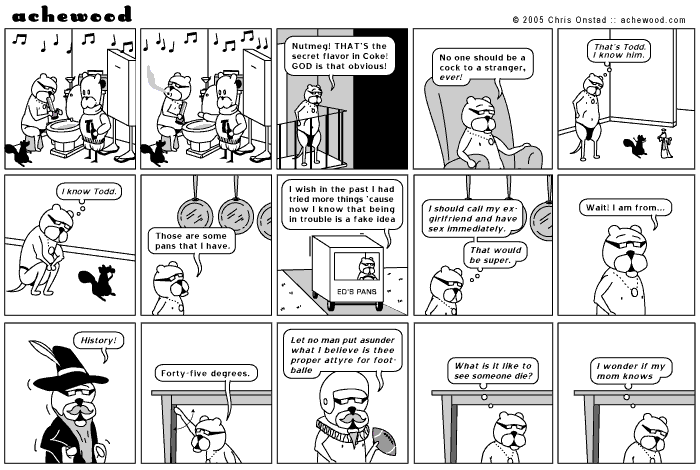
A Letter to Jeff Tweedy
So I’ve been threatening for over a year to write a 33 1/3-style book about the Uncle Tupelo album Anodyne, which has been a fixture of my musical world for–jesus–almost 30 years. The idea was stuck in permanent “I’ll get to it” status for a long time, until I read Hanif Abdurraqib’s great book Go Ahead in the Rain: Notes to A tribe Called Quest. Sometimes reading a great book inspires you to get writing; so I did. And Abdurraqib’s repeated device of directly addressing letters to the members of Tribe seemed like a good idea worth borrowing. So: here’s the first little bit of stuff about Anodyne and Anodyne-related topics, and maybe being out here in the world will help make the rest of it come together.
Hi, Jeff,
So the weirdest thing is that, at least kind of, you seem to have written your own version of this letter (I don’t know to who; maybe you’re imagining someone like me writing it to you) in the form of the Golden Smog song “Can’t Keep From Talking.” It’s a great song about a fan reckoning with the weird imbalance in their relationship with a singer. “I know you don’t know me / but I know a lot about you / you’re the one who knows me / better than I do.” I think a lot about the neat turnaround happening with the language of those lines; but more than that, I think about the truth contained in them: fans know a lot about the artist, but are just part of an anonymous mass to the artist; but they became fans in the first place because the work of the artist so perfectly described what was going on in the fan’s head.
Continue reading A Letter to Jeff TweedyWASPS!
 I lived with my grandparents during my senior year of high school. Surprisingly, given what was coming, this didn’t have anything to do with a big rupture with my parents or anything like that; my father had gotten a job in a tiny town in northwest Missouri, and I was convinced that graduating towards the top of a class of 8 people wouldn’t look as appealing to colleges as doing pretty well in a class of 230. So I suggested to my parents that maybe it made sense for me to stay in Blair, and they agreed. Legal guardianship was set up and, the day after I finished my junior year, I moved into what had been my grandmother’s bedroom.
I lived with my grandparents during my senior year of high school. Surprisingly, given what was coming, this didn’t have anything to do with a big rupture with my parents or anything like that; my father had gotten a job in a tiny town in northwest Missouri, and I was convinced that graduating towards the top of a class of 8 people wouldn’t look as appealing to colleges as doing pretty well in a class of 230. So I suggested to my parents that maybe it made sense for me to stay in Blair, and they agreed. Legal guardianship was set up and, the day after I finished my junior year, I moved into what had been my grandmother’s bedroom.
It took me well into my adulthood to recognize that my parents were kind of crazy, but my grandparents were the kind of crazy that was easily visible at the time. My grandmother was both beset by legitimate health problems and an extreme hypochondriac; she also had absolutely no sense of personal or emotional boundaries (during my undergrad years, she would often call me and ask me when I was going to get someone pregnant so that she could have some great-grandchildren) and was very fond of building a metaphorical wooden cross and climbing up onto it. She was a heavy menthol smoker, but thought she was hiding it from everyone by doing all of her smoking in the bathroom with the door shut; this clever ruse was betrayed by the heavy menthol stank in the bathroom, and by the empty cartons of cigarettes jammed into the cupboard under the sink.
The Iowa City Police Log
Quick update from December of 2023: the Police Log comics are now a finished project, with an unfortunate coda. I’m still proud of the comics, though, and they’re still available as linked. If you see anything involving the Iowa City Police Log and AI art, please know that I had nothing to do with it.
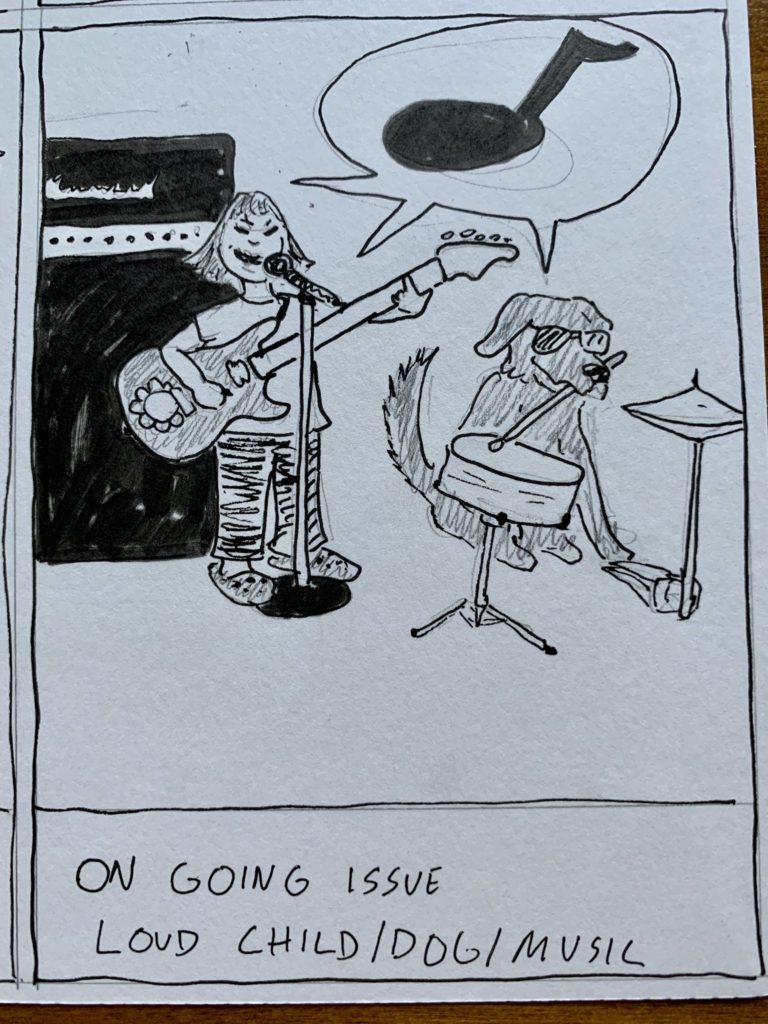
Every morning, I get up, consult the twitter feed of the Iowa City Police Log, and draw a one-panel cartoon based on it. This started out as a get-through-the-winter whim and has turned into a get-through-a-pandemic-hellscape coping mechanism. The resulting comics get posted to a Twitter thread and to my Instagram feed, in both cases paired with their inciting Police Log entry.
People seem to be pretty into these, which is great! TPT, Minnesota’s Public Television station, even did a short piece on them, where I talk about my process, my motivations, and the sort-of-intentional larger political point of the strips in an era where we as a society are rethinking the way police departments should be constituted. They also put KEITH PILLE – CARTOONIST on the screen, so I guess despite endless questions about my artistic identity, now I know: I’m a cartoonist.
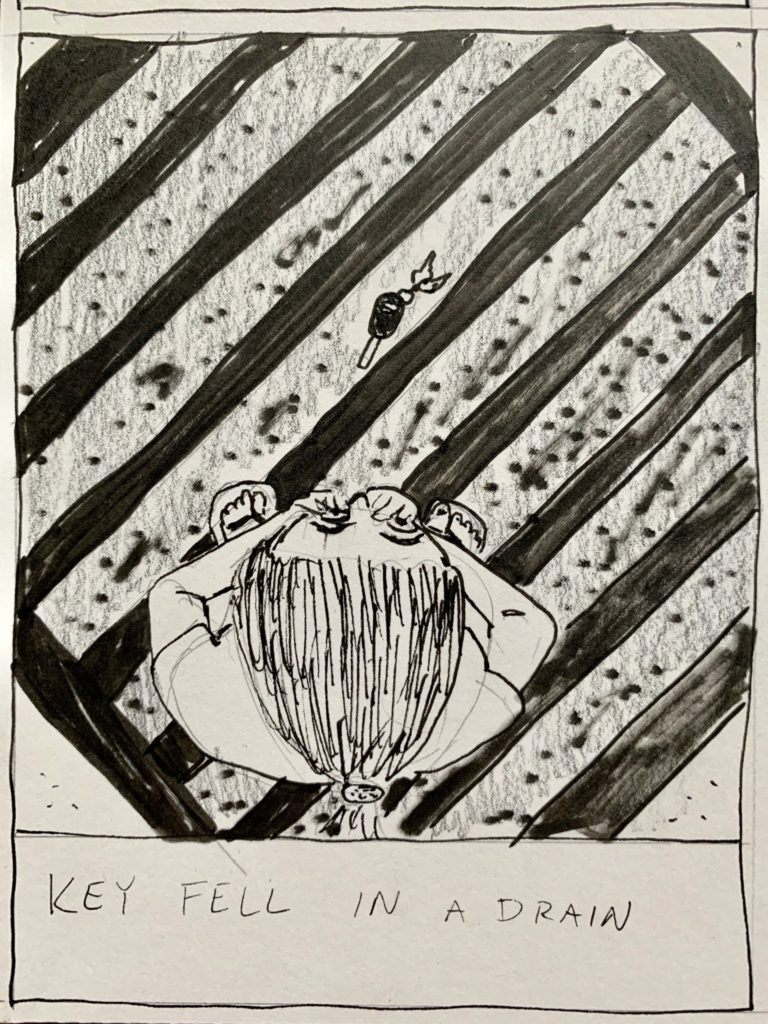
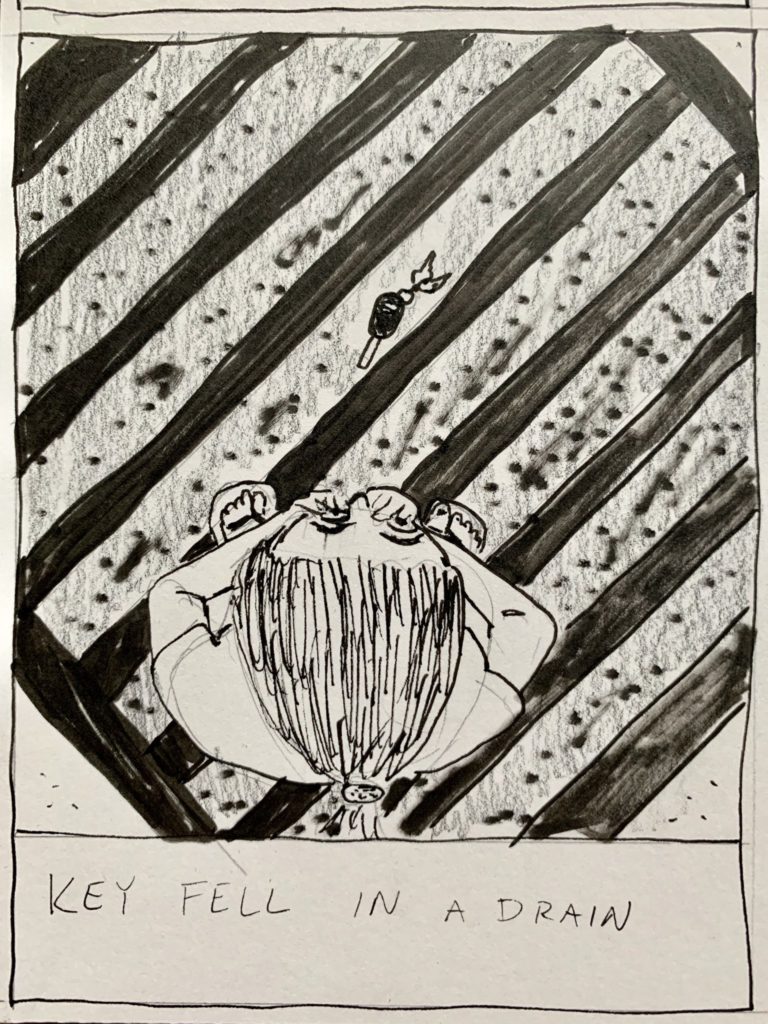
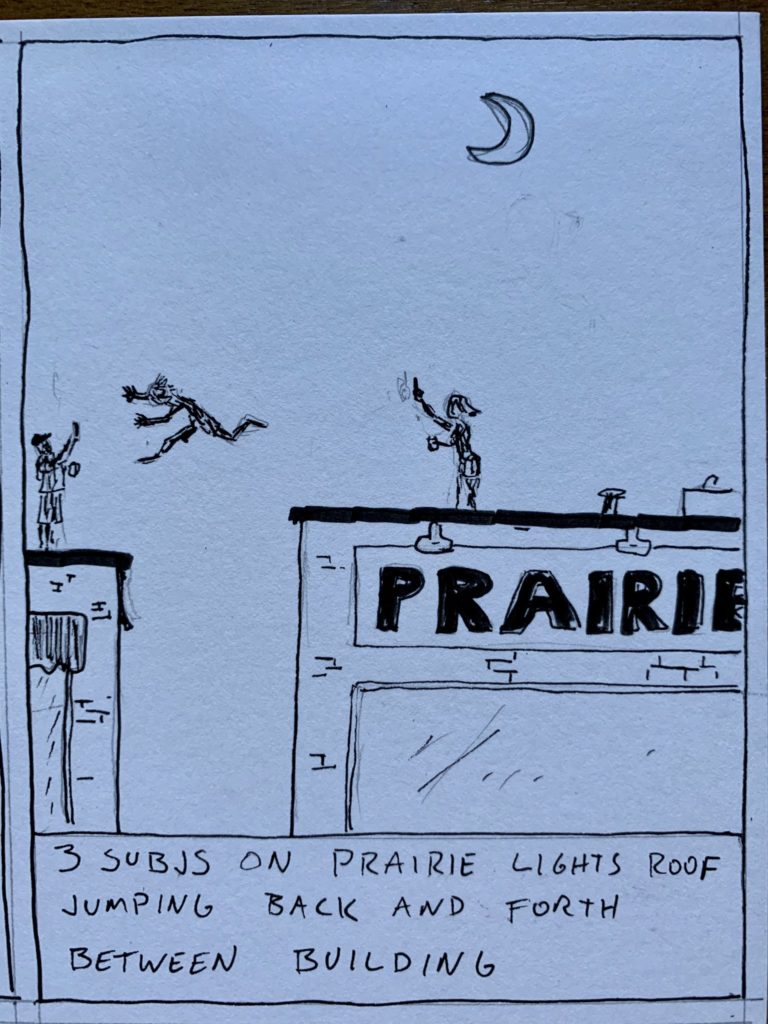
PSA With Guitar
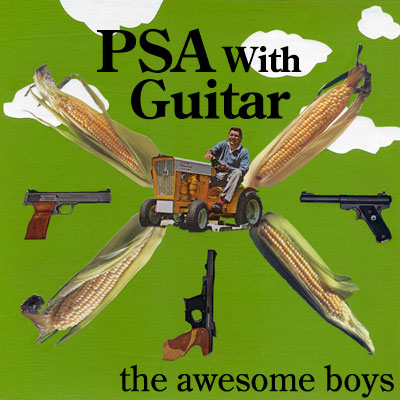
So I recorded an EP of acoustic country covers of Clash songs (technically Clash and Clash-associated songs, since two of them are songs the Clash themselves were covering). I’m really proud of it. I’d like you to take a listen at one of the links above, and if you feel like downloading the MP3s, please feel free.
I started out the year planning on recording an Awesome Boys* album, but the plan was for it to be all noise rock, continuing the sound of the EP I recorded in 2019. But as the work started on that in February, I realized that my musical mood was shifting back towards country-rock (no doubt affected by all the time talking about Uncle Tupelo for We’ve Been Had). And then the pandemic hit, and the world full-on caught on fire, and I just couldn’t escape the feeling that we were living in Strummer Times. And that was just when the pandemic kicked off; in May, when Minneapolis burst into flames after a police killing and took the rest of the country with it, it seemed even more applicable. The first verse of “Know Your Rights” could be about George Floyd, for fuck’s sake. So the idea of an EP of country-style Clash covers gained a foothold in my brain and just kept taking up more and more space.
Uncharacteristically for me, I spent about a month rehearsing and working out arrangements for the songs I picked (my neighbor must have gotten so tired of hearing me work on “Straight to Hell” on my front porch). And I decided early on that I’d need to edit some of the lyrics. Which felt sacrilegious, given that Joe Strummer was a towering figure and I’m just a guy, but some of the words are so specific to his life and outlook that they didn’t work for me. Or, in the case of the second verse of “Know Your Rights,” the dystopian situation described by the Clash in 1982 is actually too supportive and generous to sound bad in the dystopian situation of 2020.
I spent about a week in early July recording basic tracks in my home studio setup, and then another few weeks mixing. My starting point for the target sound was the way Peter Buck produced Uncle Tupelo on March 16-20, 1992, but I wound up wandering a bit from that, especially because covid quarantine meant that I had to do all of this myself instead of being able to organically have a band vibe develop.
For cover art, my wife, Rebecca Collins, is a great collage artist who had recently started exploring punk-aesthetic collages. So it seemed like a natural thing to ask her to make a cover. We talked a bunch about what I wanted it to evoke: the Midwest, menace, humor, death. her results speak for themselves; and now we own several cut-up vintage copies of Guns and Ammo.
So, yeah. Check it out, and I hope you like it! Some day when live music is a thing again, I’d love to perform these live.
*You might point out that it’s confusing and stupid for me to record music in the real world and attribute it to The Awesome Boys when that’s the name of the fake band in my old webcomic that I always insisted wasn’t autobiographical. And you’d probably be right. But it seemed funny in 2011 and at this point I’m just kind of used to it.
The Nowhere Band Restoration Project
So for ten years, from 2007-2017, I made a webcomic called Nowhere Band that was about life as it’s really lived in a music scene: a series of misadventures that are great and fun and affirming and frustrating and maddening and which, ultimately, don’t end with fame and fortune. I wanted it to be as emotionally real as possible. I always felt like I did a pretty good job with that, and got some outside validation on that front, both from individual readers (who I always loved hearing from) and from Minneapolis media outlets like MPR News and City Pages.
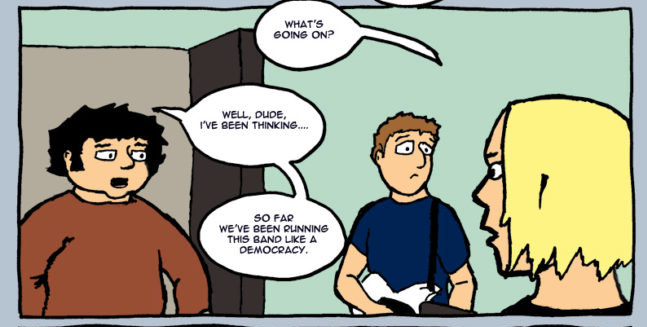
As the years went on (and the art and general cartooning craft got better), the strip moved from being about people in a band to being about people who used to be in a band and maybe kind of still were but weren’t sure. Which I think is also a headspace worth exploring, since that’s where we all wind up! But in 2017, after several hundred installments, I ended the strip because 1) I was far enough removed from band activity at that point that I felt like I was running out of material, 2) I was getting ready to finish grad school and knew that my thesis project was going to eat up all possible cartooning time, and 3) since November of 2016, the strip had increasingly just been swallowed by the dread of living in Trump’s America. So I gave myself the gift of writing the strip towards a conscious, planned ending instead of just letting it peter out the way a lot of webcomics do (and the way it nearly had a couple of times previously).
Continue reading The Nowhere Band Restoration ProjectArt Is My Middle Name
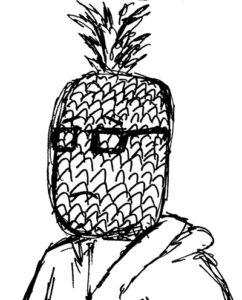
…is a free newsletter I’m starting as a birthday gift to myself. Each installment will be a short-to-medium thought about art, working with a very broad definition of art: visual arts, comics, movies, music, literature, god knows what else; and covering both appreciating art, art history, art theory, making art, all that. Sometimes focusing on individual works of art or artists; sometimes wandering all over the place. I can’t promise structure or high-quality copy-editing, but I can promise fun (and a bare minimum of one post a month). And although I hope this’ll still be fun and interesting for my pals from the world of academic art history, I want to aim this more at people who like to appreciate art and culture but haven’t spent a bunch of time in seminars talking theory.
SO SIGN UP OVER AT SUBSTACK! I’m in the process of working through my mountain of ideas for posts, and I’ll start sending them out once there’s a moderately-sized pool of subscribers.
SOME TOPIC IDEAS THAT MIGHT MAKE IT INTO THE NEWSLETTER:
- Kurt Vonnegut’s Bluebeard vs. Mary Gabriel’s Ninth Street Women on telling the story of the Abstract Expressionists
- Pablo Picasso, Asshole
- What do people mean when they jabber about Postmodernism?
- So let’s talk about ugly condo buildings
- You’re probably qualified to say that you have refined taste
- Kehinde Wiley makes Jacques-Louis David retroactively worthwhile
- Disney is choking the life out of our culture
- So let’s talk about auteurist comics
- Lynda Barry’s Making Comics is a godsend
- David Bowie’s big final accidental performance art piece
AGAINST DAD ROCK
I hate Dad Rock. Not the music, at least not categorically; I love it and hate it at more or less the same rate that I love and hate all of the other imaginary categories of music. No, it’s the term I hate.
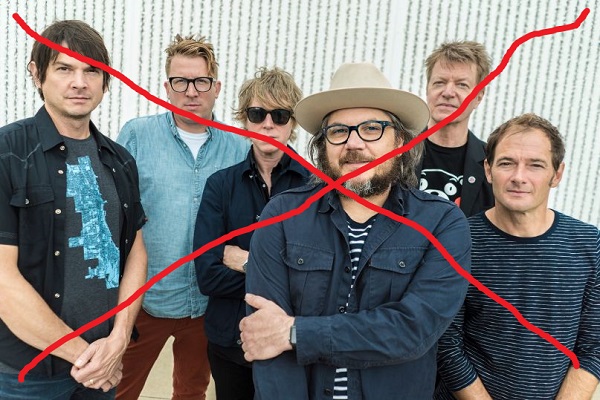
You’ve heard the term, right? Basically means safe, nonthreatening rock (mostly) that appeals mostly to people over 35-ish. When I first heard the term, it meant the “classic rock” that my generation’s boomer parents were always listening to: Pink Floyd, Steely Dan, the Beatles, the Stones, Van Morrison, you know the drill. As Gen X has gotten gray and paunchy, I’ve started hearing Wilco, the New Pornographers, and the Mountain Goats get put into the file.
Some of that is music I like, a lot of it is music I hate, but the label bugs me either way. Part of it is the specific choice of modifier: “dad.” I don’t have kids, I’m not going to have kids, and I’m irked at the intrusion of child-having status as a qualifier in a situation where it doesn’t apply. But really, that’s not the problem; again, it’s not really the music that I love that’s getting the label (I was a Wilco superfan when I was younger, but I drifted away from them around 2007; coincidentally, around the time they started getting labeled as dad rock).
Continue reading AGAINST DAD ROCKWelfare Music
Disc 2 Track 1
In 1994, Brian Henneman (probably) could have joined Wilco as it phoenixed it way out of the ashes of Uncle Tupelo. He chose not to (assuming it was actually a viable choice), and why not? His own band was really taking off.
The Brooklyn Side sounds exactly like what it is: a natural continuation of The Bottle Rockets, but with more budget to spend on studio time and better gear. Recorded at Coyote Recording Studio in Brooklyn (the album’s title appears to come from the climactic line of “Sunday Sports,” but there’s kind of a chicken-and-egg question lurking here) in 1994, Brooklyn catches the band in the same form as their first album, just a bit more polished and better produced. The collection of demos on the combined reissue makes it sound like many of the songs come from the same creative burst that populated the first album.
Continue reading Welfare MusicFRANKLIN, CHARLES SCHULZ’S ACCIDENTAL TOKEN
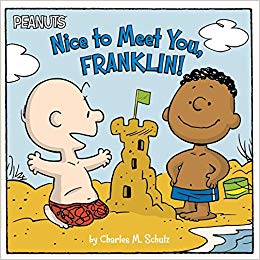
It always hurts to talk about when one of your heroes fails, but that’s what I’m out to do here. Charles Schulz is one of the great figures in comics; Charles Schulz sometimes fell on his ass. He did here. Acting with well-documented good intentions, he tried to do a good thing, and slid into what could most charitably be called mixed success. By introducing Franklin, a black character, into his immensely popular comic strip Peanuts, Charles Schulz wanted to harness his cultural power and use it to send a positive social message about racial harmony. He explicitly wanted to integrate his strip in a way that wasn’t demeaning or insulting. Thirty years later, though, Franklin was considered one of the prime exemplars of tokenism, a perception that has only grown as time has continued to pass.
Peanuts in 1968 was a cultural juggernaut, appearing in well over 2500 newspapers. In an era when newspaper comics carried a cultural weight nearly unimaginable today, Schulz was at the very top of the profession, giving him one of the most visible platforms in the country to trumpet any message he chose.
For the most part, Schulz avoided politics in the strip, instead examining emotional and existential humor.

The 2020 Birds of the World Printable Calendar
Last October, I inadvertently participated in Inktober by drawing a bunch of funny birds, like the ruby-throated hoverbro or the barre chord owl. Then the drawings sat in my sketchbook, unused and forgotten. Until! Until a friend asked me to make her a calendar, and I remembered that I had a buttload of drawings just sitting around doing nothing. A little bit of photoshop fussing, et voila:

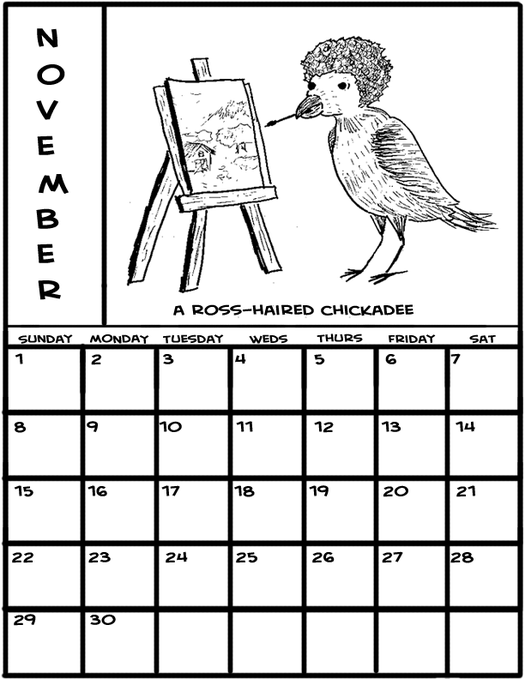
I combined the calendar into a single PDF, printable on regular office 8.5×11″ paper. Feel free to download, print, and let your boss contribute 13 sheets of paper towards making your cube more fun in 2020!
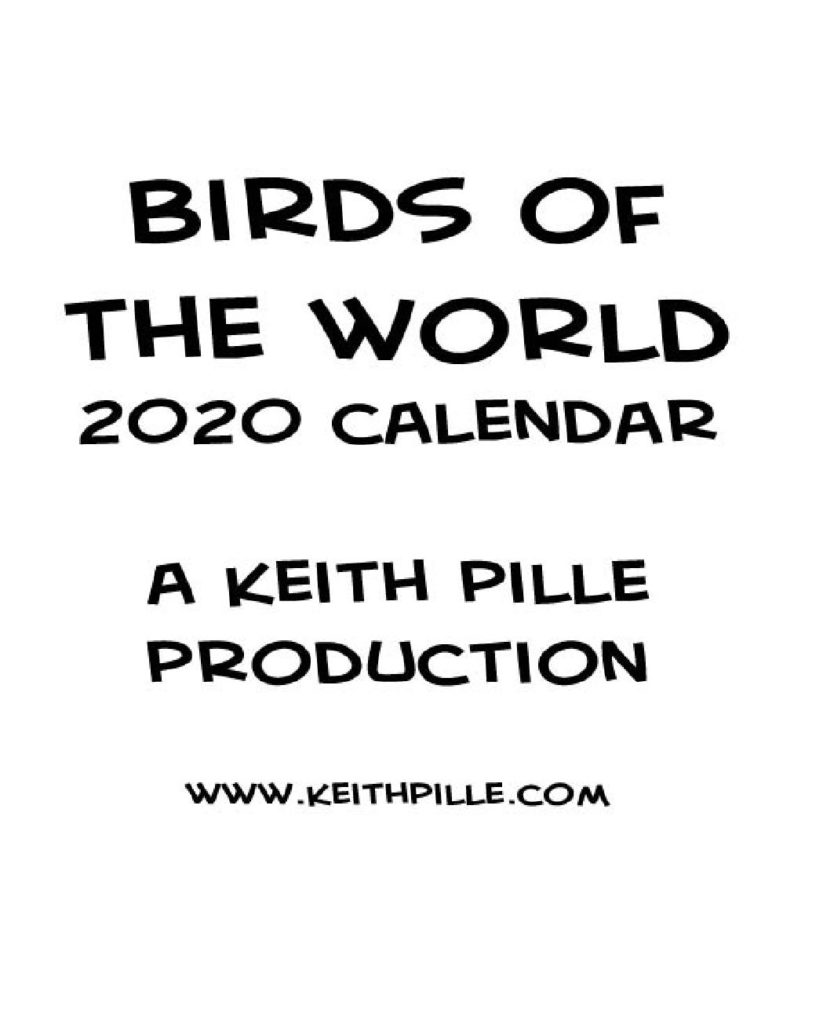
Interlude: A.M. (Wilco)
Disc x Tracks 1-13
To make one logistical element clear: I haven’t been able to nail down the order of events in 1994 involving the recording of Wilco’s A.M. and the Bottle Rockets’ The Brooklyn Side. I know they both happened in 1994, and I know that the A.M. sessions ran roughly from June through August, and that the Brooklyn Side sessions happened some time that year; could have been before, could have been after. I’m choosing to wedge A.M. in between the first two Bottle Rockets albums, but that might not be accurate, and certainly doesn’t reflect the release order.
Anyway: for Bottle Rockets fans, A.M. represents a portal to an alternate universe that briefly opened in 1994. Uncle Tupelo had broken up, with most of the 1994 lineup of the band staying clustered around Jeff Tweedy. To get the new enterprise off the ground, Tweedy reached out to his friend and former almost-bandmate Henneman to play lead guitar on Wilco’s first effort as the band found its feet. Henneman stepped in and left his mark all over the record.
Continue reading Interlude: A.M. (Wilco)TOM CLANCY AND THE DUBIOUS COMFORT OF BOOMER DADS
I’ve had a rough year. I had two dogs die, my house has needed some expensive repairs, and my habit of closely following the news has turned into daily exposure to toxic waste. We all crave simple comforts in difficult times, and I’ve fallen back into an old habit: when I’m in the mood to read comforting trash, I reach for Tom Clancy. And after the current bender, I think we should talk about him a little.

Right now, through time and space, I can hear the question you’re asking yourself: why do I care about the work of some hack writer of right-wing airport trash who’s been dead for a decade? And that’s a good question, one I’ve been wrestling with inside my head for a while now. I have a few solid answers: first, because the work of said dead right-wing hack writer really does provide a perfect encapsulation of one of the dominant forces in our dyspeptic, sliding-through-disasters-towards-even-greater-disasters political system, and to understand that is to understand another corner of the current ongoing shitshow. Tom Clancy’s books are by, of, and for Boomer Dads, and if understanding the mind of the Boomer Dad isn’t sufficient to understanding what the hell is happening in this country, I think it’s at least necessary.
Continue reading TOM CLANCY AND THE DUBIOUS COMFORT OF BOOMER DADSLonely Cowboy
Disc 1 Track 13
If The Bottle Rockets sags on its back half, it at least ends on a strong, if depressing, note. “The Lonely Cowboy” is the Rockets in full short-stories-about-small-towns mode, a character study about a man who feels like he’s living in the wrong time. There’s an almost rider-on-horseback swagger to the song, but that can’t really hide the crushing desperation of phrases like
Sometimes he goes down to the local theatre
And watches pale riders on the movie screen
At times it seems so unbearable and unfair
He just falls apart at the seams
This is strong stuff. It’s a rare Bottle Rockets song written by other members of the band (Ortmann and Parr), but it fits in seamlessly with the rest of the band’s work, and Henneman fully inhabits the character he’s singing about. If the Rockets’ small-town mopers can drag sometimes, this one works really well because it’s so specific; we’re hearing details about the suffering and interior life of a particular, well-drawn person, and that makes all the difference (contrast this with the universal dreariness of songs that just focus at the town or even regional level and say “this sucks”). No instrumental pyrotechnics on this one, no flashy drums or guitars, just raw competence that conveys weariness without being wearisome. A damn good end to a damn good album.
The combined version of The Bottle Rockets and The Brooklyn Side currently available on Spotify contains some bonus tracks, but I’ll be setting those aside for this project, since they’re mostly demos of songs that have already been covered or will eventually be covered. So that’s it for The Bottle Rockets. But it’s not time for The Brooklyn Side quite yet; first, watch for a longer entry about another high-profile Henneman project that was going down at about the same time.
Hey Moon
Disc 1 Track 12
A light country song, so close to being disposable that I nearly forgot to do an entry for it. Henneman’s lovelorn narrator addresses the moon on the subject of the end of a relationship; they guy from “Got What I Wanted” had a few drinks and went outside to talk to the moon.
The instrumentation is crisp and the harmonies are nice, but this is fundamentally just the Bottle Rockets in “unusually good bar band” mode. A very nice John Keane pedal steel part is pretty much the only special thing here.
The Very Last Time
Disc 1 Track 11
Going back to listen to the song for this piece, I was surprised how fast and produced it is. Not that, in an absolute sense, it’s very much of either; but the version of it that exists in my memory is just Henneman’s voice and guitar creeping along at a carefully-controlled tension-inducing glacial pace. Those are the parts that stick with the memory, at least for me. The surrounding material that enables the effect just got edited away.
Continue reading The Very Last TimeBud Nannery Theme
Rural Route
Disc 1 Track 9
It’s not that the back half of The Bottle Rockets is bad by any stretch; it’s just inessential. And so, “Rural Route,” a bar-band rave-up so similar in form and content to “Manhattan Countryside” that it once again could be a continuation of the same song. Maybe there’s an argument to be made that proximity strengthens the two songs; “Manhattan Countryside” is a guy getting fed up with what’s happening in his town, and “Rural Route” is him convincing himself to leave.
Of course, the two aren’t one extended song. For one thing, Route is, for the first time we’ve encountered, a Bottle Rockets song not written by Brian Henneman. Instead, Route is the handiwork of Robert Parr, brother of the Brockets’ rhythm guitarist. If the lyrics aren’t as witty as a typical Henneman joint, their description of rural disillusionment is very much in the Henneman wheelhouse (it strikes me now that the two dominant themes of this album are lust and rural disillusionment, sometimes at the same time), and he sings it as fervently as one of his own.
But really, there’s not much here. A great lead guitar part, more fun drum work by Ortmann, and some sentiments we’ve heard before. This runs into the same problem Chad and I discovered on We’ve Been Had as we got mired in the repetitive Uncle Tupelo songs on the back half of Still Feel Gone; there does come a point where even the most intensely-sung complaints about small-town ennui become just the same old thing.
Manhattan Countryside
Disc 1 Track 8
“Manhattan Countryside” is a straightforward bar-band rocker, an extended cry from Henneman’s heart against small-town sprawl. It’s a good song but not a great one, missing some of the weight that elevates the standouts on the first half of the album. The song seems to acknowledge its own minor-work status, hustling on and off the stage in the space of two minutes.
Continue reading Manhattan CountrysideOFFICE POLITICS
As late fall settles onto Minnesota like an unpleasantly weighted blanket, the natural inclination is to watch some TV. Rebecca and I realized that, while we’d watched the first season of The Office (US) when it aired, we’d drifted pretty quickly. With binge weather upon us, and the clock ticking for the show to leave Netflix, we decided to go in hard on it, and powered through several episodes a night.
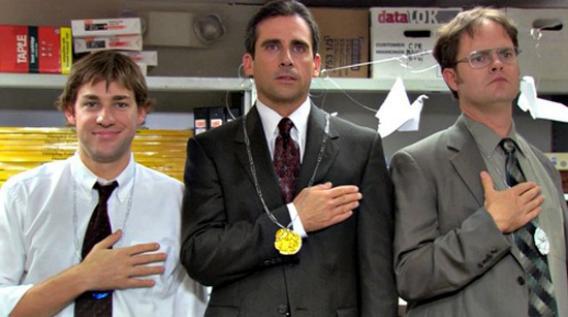
And: The Office is fun! The characters are relatable and human. The writing is sharp, and knows where to poke at the oddities of spending your days in badly-lit spaces with other people who don’t want to be there. The observations can be apt: one of the show’s central (maybe accidental) theses is that often the worst people to work with are the ones who can’t just let a job be a job but instead have to turn it into either their family or a crusade that gives their lives meaning (this is Michael Scott and Dwight Schrute, respectively). The show can also be a fascinating timeline of cultural change, as with the way the show handles Oscar being gay moves from turn-of-the-century kid gloves to a more current “so what?” attitude. And the show gave us Creed Bratton, maybe the most consistently surreal sitcom character since Andy Kaufman was on Taxi.
But as fun as it was to binge on The Office, I couldn’t help but notice that however sharp the writing was, it pulled punches. And if you stepped back and looked at the show, its point of view was weirdly constrained. There’s some value, I think, to taking a closer look at that.
A PLANT WHOSE ROOTS ARE BOUND UP IN CAPITALISM
Continue reading OFFICE POLITICSGot What I Wanted
Disc 1 track 7
To this point, a full 50% of the songs on The Bottle Rockets have been about being horny, either in a silly or a desperate fashion. “Got What I Wanted” flips the script, checking in on a man glumly realizing what all these hormones have gotten him; this song could easily be the narrator of “Trailer Mama” waking up the next morning hung over and full of regret.
Continue reading Got What I WantedEvery Kinda Everything
Disc 1 Track 6
And then, after the escalating heaviness of “Wave That Flag” and “Kerosene,” the Bottle Rockets get silly. Really silly. Silly enough to make “Gas Girl” sound like a sober meditation on human frailty.
“Every Kinda Everything” opens with a ridiculous extended metaphor about cars:
Well I know we’re different and this might sound heavy
But I’m thinking that I’m a Ford and baby you’re a Chevy
That’s ok, I can appreciate any good car
Can’t you tell by the way I’ve been bumping your bumper
That I’m following close, trying to be your lover
Ain’t gonna hurt ya, honey that’s what a bumper’s for
Kerosene
Disc 1 Track 5
In the house in Blair, NE, where I grew up in the late 70s and early 80s, our next door neighbors had a son named Sammy. He was maybe 8 years older than me, so we weren’t exactly pals, but we were friendly and he’d occasionally come over and slum it with the younger kid; the two things I particularly remember were him helping me build an elaborate Ewok village on the side of a tree for max DIY Star Wars guy fun, and him proudly showing off the new set of nunchucks he’d just gotten.
Continue reading KeroseneWave That Flag
Disc 1 Track 4
(Look, I recognize that it’s confusing that this is the one where the song title is the same as the series title; sorry)
We kick off with twisting, insidious guitar parts that weave into each other for several bars before the rest of the band comes in. The narrator—and it feels very much like this one is Henneman is speaking as himself—is somewhere in town and sees something he doesn’t like:
Continue reading Wave That FlagTrailer Mama
Disc 1 Track 3
“Trailer Mama” takes a baton handoff from “Gas Girl,” almost sounding like it’s picking up a beat the latter had dropped. An interesting thing happens with the chords between the two songs, too; “Gas Girl” moves between E, D, and A, while the main riff in “Trailer Mama” is an extremely hepped-up guitar moving through D, F, and A. So, similar enough to almost sound like it’s the same song being continued, but different enough to sound kind of wrong if that’s the case. Which is a neat trick, because if “Gas Girl” is a fun and lighthearted song about a crush, “Trailer Mama” is an urgent, throbbing song about we-gotta-act-on-this-RIGHT-NOW lust.
Continue reading Trailer MamaGas Girl
Disc 1 track 2
And then, after two minutes of quiet rumination with a banjo, the entire band takes the stage and the amps are turned on. The expectation that this was going to be a quiet, folky album gets tossed on its ass. These guys are here to rock.
Continue reading Gas GirlEarly in the Morning
Disc 1 Track 1
The Bottle Rockets’ eponymous first album kicks off modestly, almost seeming like a direct continuation of Brian Henneman’s work on Uncle Tupelo’s March 16-20, 1992. Henneman had served as an all-purpose utility string player on that album (which was engineered and mixed by John Keane); he opens up this album (engineered and produced by John Keane) with a quiet song consisting of nothing more than a Tupeloid banjo* part and a solo vocal. It’s a one-man piece fronting a full-band album.
*update: a few weeks after the initial post, I’ve spent a lot of time messing with a resonator guitar, and now I’m not sure if the string part for this song is a banjo or a resonator; they can sound an awful lot alike. Discogs does credit Henneman with banjo on the record though, and I’m not sure where else it’d be. Anyway. It’s definitely Brian Henneman playing something with at least 5 strings.
The tenor of the album will change shortly, but this quiet moment is enjoyable on its own merits and a nice marriage of form and content in a song, musing about how much it sucks to get up early. An ongoing question with Henneman’s first-person songs will be which ones are being voiced by a character and which are direct statements of his own feelings; to me, this one feels straight from the heart (this might be because I *also* hate getting up early, and am looking for kindred spirits). The sensory details are immediate, for one thing. For another, the lines about knowing dark and night and neon lights certainly sound like the lived experience of a touring musician. Anyway, why bother inventing a character just to gripe about.
Several ongoing Bottle Rockets themes present themselves already here at the beginning: coffee, rural signifiers (there’s a rooster crowing before the first line is even over). Henneman’s Missouri accent, which will eventually step directly onstage for discussion in “Idiot’s Revenge,” adds to the country atmosphere; he leans into this with his idiosyncratic rendering of “early” as “err-lie.”
Over the course of We’ve Been Had, Chad and I have marveled consistently at how well Jeff Tweedy and Jay Farrar sequenced songs on Uncle Tupelo’s albums. Their high-water mark for this came with 1993’s Anodyne, which starts out sounding like a quiet country follow-up to March 16-20, 1992 before morphing into a squalling guitar attack. The similar trick pulled with the first few songs of The Bottle Rockets (also recorded in 1993, and featuring cameos by both Tweedy and Farrar) leads one to think that Henneman was paying a lot of attention to what worked while he was serving as Tupelo’s guitar tech.
Wave That Flag Series Intro
Project Announcement, Scope, General Throat-Clearing
Disc 0 Track 0
WHO ARE THE BOTTLE ROCKETS, AND WHY DO WE CARE?
Stop me if you’ve heard this, but my friend Chad and I do a podcast. Specifically, a podcast that examines the band Uncle Tupelo by taking a close-ish somewhat-researched look at each of their songs. It’s a hoot (you should listen), and it’s led me to reconnect with a band that was once very important to me but I had drifted away from.
Continue reading Wave That Flag Series IntroBerlin: Living History

As my wife and I were flying into Berlin, I experienced a small wave of panic. What had I gotten us into? Was this going to be boring? What was there to do here, really? My initial pitch for Berlin as a vacation destination was that I wanted to go because of “all the history.” That sounded great and persuasive, in a vague way, sitting in Minneapolis. But now that we were about to arrive and spend a week in a foreign city where we didn’t speak the language, what did it actually mean? A week of looking at historic-site plaques? Was this going to be boring and dumb?
Happily, my little moment of freakout was entirely misplaced, and my initial instincts were right on point. Berlin isn’t a city with a lot of obvious, high-profile capital-letter Tourist Attractions; but it’s something much better: a fascinating, beautiful place where the weight of history is indeed so present and prevalent that if you’re interested in it at all, you can’t help but feel like you’re swimming in it.
I’ve been obsessed with World War II since I was 7, when I stumbled across a series of Time-Life books about the war, full of arresting, graphic photos, that my parents had left sitting around (my parents did a spectacularly bad job of shielding me from age-inappropriate material when I was a kid). My obsession with the cold war started about a year later, when my 3rd grade teacher rhapsodized proudly to my class about how our city of Blair, Nebraska, being just up the road from Strategic Air Command HQ in Omaha, would be one of the first Soviet targets when the missiles flew.
These obsessions were the initial impetus for wanting to see Berlin. My last-minute panic was based on a fear that neither the cold war or World War II lent themselves to spaces that made for fun vacation visits. My salvation was that this didn’t matter when the fabric of the entire city is visibly and irreparably altered by events. I can’t say that it’s fun to stand in the Tiergarten and read a plaque about how the trees surrounding you were all completely deforested by air bombardment and by Soviet troops advancing over the ground you’re standing on, or to stand in front of your hotel and look at the memorial cobbles commemorating Holocaust victims who once lived there; but it’s affecting and awe-inspiring in a way that transcends fun. It hits you on a different, deeper frequency. It drives home the way in which you are part of a larger continuum of human experience.

It’s one thing to walk into a museum and look at art and artifacts. It’s another thing entirely to see bullet holes in the interior wall of that museum and realize that what you’re looking at is evidence that there was a firefight in this building between people trying to take the building’s contents and people trying futilely to defend them. Again, that’s not fun, but it’s profound and affecting on an entirely different emotional spectrum.
(And about that fight: the scene I’m describing here is in the Neues Museum, which is largely full of Egyptian artifacts looted from Egypt by Prussian archaeologists in the 19th century; the top few floors, though, are European objects. Several gallery labels and signs on those floors pointedly mention that objects formerly on display here were looted by Soviet soldiers, taken to Moscow, and never returned. The irony of this kind of complaint in this kind of building is exactly what makes the historical experience of Berlin so mesmerizing.)
Consider this: in central Berlin, on land that was once part of the Berlin Wall and its “death strip,” is the Memorial to the Murdered Jews of Europe, an immersive, block-wide labyrinth of pillars that is one of the most viscerally affecting memorials I’ve ever experienced. On a block adjacent to this memorial is the nondescript parking lot that is the former site of the bunker where Hitler killed himself and was cremated. Running between these two blocks is a street named after Hannah Arendt. The historical resonances of Berlin come in a very strong, undiluted form.
History is a river. Things happen, and subsequent things downstream are driven by what happened previously. Hitler hijacked the German political system, started a war and conducted genocide, and Berlin was occupied and nearly leveled as a result; and then, downstream from that, the occupying forces eventually split the city in half, traumatizing the city with an unnatural internal boundary for half a century. That trauma, and the subsequent jubilation and rebirth, are as plain to see in Berlin as the immediate effects of the war. In place names (Rosa Luxemberg Platz, Marx-Engels Platz), architectural styles, and even traffic signage, the old separation between west and east is still plain to see if you bother to look for it. And that’s ignoring the hunks of the wall itself that have been left up as commemorations or memorials or just plain tourist attractions.
I can’t think of any American cities that have left me this strongly with the sense of standing amid the structure of history. The closest I’ve come is the southern end of Manhattan. New Orleans probably can provide the same effect if you walk around with your eyes open in the right way. I haven’t been to Boston, but I’m sure it has some amount of resonance. But overall, American cities operate under a couple of different conditions: no American city has undergone repeated traumas as massive as Berlin, and the American mode of operation is to march stridently away from the past, not to acknowledge it. You’ll find precious few memorial cobbles scattered around American cities to commemorate the victims of slavery or the Native American genocide. And as far as that goes, I’m painfully aware of my own white middle-class nature here; when I say that “no American city has undergone repeated traumas as massive as Berlin,” I recognize that, say, Dakota people currently living in Minneapolis no doubt have an extremely different viewpoint on that matter.
To my perception, at least, the everyday culture of 2019 Berlin had a laid-back, free-spirited vibe that I found immensely refreshing. In all kinds of little ways, from casualness with dogs to willingness to abruptly repurpose old buildings to surprisingly low levels of fussiness (and disclaimer paperwork). In the aggregate, this seems to me to add up to a much greater tolerance for uncertainty and risk in Berlin than one finds in litigious, fear-dominated America. Maybe that’s just the German national character now, or at least the Berlin civic character. But maybe it has something to do with living in a city that’s been through several different flavors of hell within living memory, much of it self-inflicted, and then undergone a rebirth. After all you’ve been through, all of which you still viscerally feel just walking down the street, why worry about whether people on a bike tour are wearing helmets? What’s the worst that could happen?
In 1933, a fire gutted the Reichstag building, giving Hitler the political opportunity to consolidate power and bring the Weimar Republic era to a formal close. In 1945, the shell of the Reichstag building served as one of the final redoubts for German soldiers defending the city, and the central objective for Soviet soldiers fighting through the Tiergarten and across the river Spree. After Germany reunified, the building was rehabilitated to serve as the seat of the new German parliament. To symbolize the new era of governmental transparency, the Reichstag’s original 19th-century dome was replaced with a large glass beehive lined with spiraling walkways, from which one can climb up and look out at the city, or down at the legislative chamber directly below. The vagaries of trip scheduling dictated that we could only get in to climb the beehive at 9:45 on the last night of our time in Berlin, so we visited it on a clear, slightly chilly spring night. It is by far the most beautiful and aesthetically powerful governmental building I’ve ever been in, so emotionally affective that even the presence of an enormous group of rowdy Italian teens wasn’t enough to stop it from being wonderful, standing there at a focal point where history happened and where the future is created, staring out at the rest of the city. It turns out that Berlin does indeed have some world-class tourist attractions.
A Song A Day: Drinkin’ Champagne
DRINKIN’ CHAMPAGNE | DEAN MARTIN | THE ESSENTIAL DEAN MARTIN
In A Song A Day, I’ll hit shuffle on my full Spotify collection of songs and write an immediate reaction to the first thing that comes up.
A few years ago, I read DINO, Nick Tosches’ book about Dean Martin, and honestly, it affected me more than just about any other music book I’ve read (and I read a lot of music books). In Tosches’ portrayal, Dean Martin came across as the most terrifyingly empty nihilist I’ve ever come across. No ambition to speak of, no thoughts, really, just appetites to be filled and a happenstance career that allowed it all to happen. Any narrative where you come out thinking that Frank Sinatra looks like a principled stand-up guy by comparison is a dire one.
But in that stretch, I did listen to a bunch of Dean Martin, and I can’t say that I don’t like some of it. I don’t think he was a guy who put any effort into his art, but sometimes Martin’s natural abilities couldn’t help but make great things.
“Drinkin’ Champagne” is not one of those cases. This song is a dog. The production manages to be both antiseptic and saccharine, with perfectly-balanced awful, bloodless instruments making a bead for terrible strings and the lamest possible background singers to lay in. Maybe I’m not being fair, maybe I’m allowing my own musical baggage to carry too much weight, but the sound of the instrumentation here is just a series of signifiers pointing to a file in my head labelled “THE TYPE OF MUSIC I HATE.” And central to it all is Dino’s voice, which just isn’t good here. He slurs and stumbles and sounds like he doesn’t give a shit. Nihilism aside, he made some great songs before he decided to just coast and crank some shit out here and there. This song is pretty clearly afterwards.
A Song A Day: Invitation
A Song a Day: Powderfinger
POWDERFINGER (Live) | NEIL YOUNG | LIVE RUST
In A Song A Day, I’ll hit shuffle on my full Spotify collection of songs and write an immediate reaction to the first thing that comes up.
https://www.youtube.com/watch?v=G2-Wp7D7BVk
Oh boy. Lots here.
1. MUSICAL
I love Neil Young, and this is one of my favorite of his songs. The way his voice floats over the dustcloud of distorted guitar. The way that dustcloud periodically resolves from big rusty sheets of noise into clear, discrete lines and then dissolves again. The way the live version swings (in a leaden, Neil Young-y sort of way) much better than the studio version. The way the lyrics tell a story that’s kind of ridiculous (when I played this song a lot on my undergrad radio show, my friend and cohost Megan once just said flatly, “you know, this isn’t really a song that speaks to my experience or lifestyle.”) but still makes it sound urgent and compelling. Those lines “red means run, son / numbers add up to nothing.” If you’re buying what Neil Young’s selling, this is the primo shit.
2. AUTOBIO (a)
I spent my 20s playing bass in a country-punk band, and I insisted that we learn Powderfinger and play it as often as possible. I’m not sure, but there’s a good chance this was our most-played cover. This is one of the handfuls of songs from those days that, if needed, I could grab a bass and go onstage and play now with zero fear about not remembering the chords (the song also was front and center for me as I switched from bass to guitar, and was one of the songs I learned guitar on; so I could probably step up and cover the guitar part, although I might want to run through some of the lead sections backstage). I insisted on singing it, too, which was kind of a bold choice given that my vocal range has no overlap with Young’s and my attempt to get there made me sound like Wayne Coyne huffing helium while being fed through a meat grinder.
3. AUTOBIO (b)
But this was also one of my father’s favorite songs; that’s how I learned about it. We’d gotten a tape deck for one of our cars, and my mother got my father a copy of Live Rust on tape, and we were driving around listening to it, and when “Powderfinger” came up, my mother turned around and said, “this is your dad’s favorite song.” She later told me that he particularly related to the line, “just think of me as one you’d never figure.” My father’s life was a slow-build exercise in deferred choices leading to frustration, leading to rage, leading to the white-hot destruction of most of his personal relationships, including the one with me; our last communication was an email from him offering to pay for me to change my last name to anything but “Pille.” For the sake of my own mental health, I try not to think about him much. But if I do, I generally think of him as one you’d never figure.
When that thinking does happen, it’s usually when I’m playing that song on guitar. And if I’m playing it, it’s usually on the telecaster that my parents got me when I finished undergrad, the guitar I used to write my chunk of the songs for that country-punk band. I recently thought about getting rid of that Telecaster and trading it in for a better guitar that better suited the way I play now. But I couldn’t pull the trigger on doing that, since this guitar’s my last physical link to my parents.. I kept running a cost-benefit analysis on it, but the numbers added up to nothing.
A Song a Day: Guess Who
GUESS WHO | THE ALABAMA SHAKES | SOUND & COLOR
The thing that jumps out at me about this song is the weirdness of its production. Not in a bad way! But it’s unusual! This doesn’t start out sounding like a song that’s going to chirp along over a drum machine all the way through, but that’s absolutely what it does, clicking and chirping its merry way along.
It’s full of other weird production decisions- some strings pop in! The vocals pop in and out of distortion! The entire thing seems kind of jammed into a pretty narrow sonic range. I don’t mean this in any way as an attack on the song, but the strong feeling I get is a bunch of people just idly farting around with a groove in a studio and seeing what happens as they fuss with it; and then, liking what they’d come up with, laying down a vocal over it that evokes Marvin Gaye. No clue if that’s actually how this song came to be; maybe it was actually written and carefully fussed over. But it sounds effortless and light, and that’s pleasant.
Probably because of the drum machine and the farting-around feel, this song also weirdly reminds me of the Replacements’ “Within Your Reach,” which was just Paul Westerberg and a drum machine. In that case, that song is the way it is because he was worried the other Replacements would make fun of the “sensitive” song. I don’t know too much about the internal dynamics of the Alabama Shakes, but I really doubt that’s what’s going on here.
A Song A Day: The General Lee
THE GENERAL LEE | JOHNNY CASH | THE DUKES OF HAZZARD
In A Song A Day, I’ll hit shuffle on my full Spotify collection of songs and write an immediate reaction to the first thing that comes up.
When I decided to start this project, I don’t think I could have hoped for an easier layup to start things off.
I’ve loved this song since the late 90s, since my peak of Johnny Cash superfandom. This song is the kind of ridiculous shit that only Johnny Cash could make cool- from a cash-in album put together to capitalize on the success of The Dukes of Hazzard, this song is written from the point of view of a muscle car, describing its thirst for fun and adventure in tones that make it sound like a kid’s loyal dog. The arrangement’s nuts in a very early-80s way, with way too many backup singers oohing and ahhing and a piano part that sounds like it came out of an old-west saloon.
But turning kitsch into gold was always a Cash long suit, and he does it here (it helps that the tick-tocky guitar parts on this thing chug along righteously; and note that, despite the video above, I’m pretty sure that’s not Waylon Jennings playing guitar). Goddamned if this thing doesn’t sound like an anthem of some kind. It’s the magic of Johnny Cash’s voice that he can make lines like “I’m the best pal the Duke Boys ever had / I’m thunder on the highway lookin’ bad, bad, bad” sound, well, if not cool at least vaguely serious and fun.
There’s a vague reference to the flag waving proudly, and that’s a little squicky given that the roof of the car has a Confederate battle flag, but I think this is the kind of thing you have to just shrug and consign to being from the past. Having read a bunch about Johnny Cash, I actually think there’s a decent chance he’d be on the right side of the Confederate monuments debate. That’s unknowable, of course, but that’s my read. Anyway, this is a really fun song that revels in its own dumbness, despite that weird little extra contextual thing. The ending is more of the same: cheesy bad car engine sound effects, and a problematic-but-atavistically-fun sounding of the General Lee’s “Dixie” horn.
Artpal!
You should go check out my new podcast project, Artpal!
And what’s Artpal!, you ask, and why should I check it out? Season 1 of Artpal! is a DIY audioguide to a bunch of works on display at the Minneapolis Institute of Art. I try to provide a different point of view than what the institutional voice of the museum can provide, talking about stuff like Chuck Close’s gross side or why the gender ratio of the museum’s art collection is so skewed. I also try to keep it fun and accessible. The entire first season is available for download, if you want to put it all on your phone and go to the museum in full audioguide fashion. Or the episodes are written so that you could just listen to them anywhere and do image searches if you need to.
The show’s also on itunes and Google Play if you want to skip the website (which does have full show transcripts) and go straight to the podcast experience.
Oh yeah, and remember that I have that other podcast about Uncle Tupelo…
ArtPal! A Demo tape
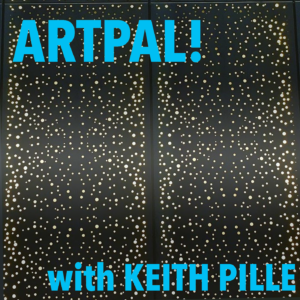 I’ve been working on a new art-focused podcast project. The whole thing should drop in the end of September or in October of 2018.. Here’s a demo version of the second episode (the first episode is kind of an atypical introduction to the whole thing). If you hear this and have thoughts, I’d love to hear them as I work on producing the actual full first season!
I’ve been working on a new art-focused podcast project. The whole thing should drop in the end of September or in October of 2018.. Here’s a demo version of the second episode (the first episode is kind of an atypical introduction to the whole thing). If you hear this and have thoughts, I’d love to hear them as I work on producing the actual full first season!
APPROACH THE THRONE: SERENA WILLIAMS, SPORTS ILLUSTRATED, AND THIRD-WAVE FEMINISM
 I’d like to start out by laying out a few background statements to take for granted in the interest of time. First, that Serena Williams is a remarkable figure in terms of dominance, significance, and public profile in the sport of tennis. Second, that Williams’ outsized public profile has largely been mediated by photography. And that these photographs have existed within an environment of toxic discourse on Williams’ appearance, in a pattern mirroring that of such other prominent black women as Michelle Obama and Leslie Jones.
I’d like to start out by laying out a few background statements to take for granted in the interest of time. First, that Serena Williams is a remarkable figure in terms of dominance, significance, and public profile in the sport of tennis. Second, that Williams’ outsized public profile has largely been mediated by photography. And that these photographs have existed within an environment of toxic discourse on Williams’ appearance, in a pattern mirroring that of such other prominent black women as Michelle Obama and Leslie Jones.
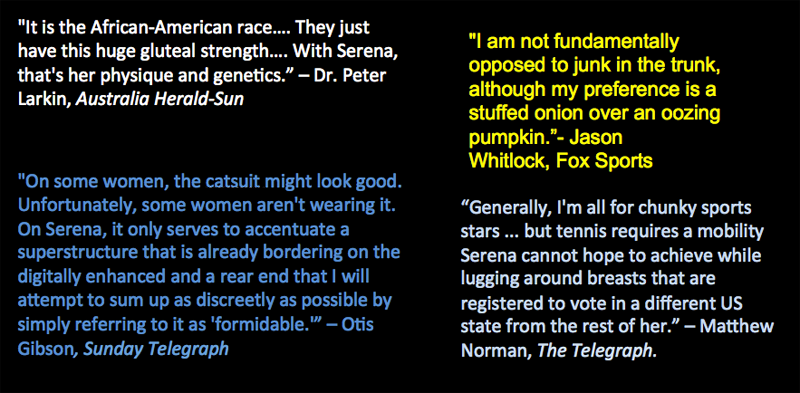
Continue reading APPROACH THE THRONE: SERENA WILLIAMS, SPORTS ILLUSTRATED, AND THIRD-WAVE FEMINISM
THOMAS EAKINS, BRUSHING AGAINST THE LIMITS OF SCIENCE
Suppose you’re a painter, and you want capture a realistic scene of two men playing chess in a parlor. How would you do it? Most people, I think, would sit in the room and paint what they saw. Or, depending on their era, maybe they’d work from a photograph. A very meticulous artist might pencil out couple of single-point perspective lines to guide the recession of the room’s furniture. Vanishingly few artists would use a separate sheet of paper to create a 3-dimensional gridded space where everything in the room was geometrically plotted out with each object considered as its own individual study. But this is exactly what Thomas Eakins did.
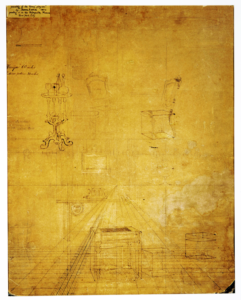
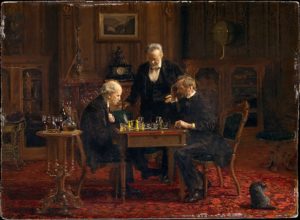
There’s a decent chance your reaction is: Thomas Who? Eakins is an odd case, a man considered one of the leading American painters of the back half of the 19th century who has slowly slid into something that isn’t quite obscurity but is pretty far from household-name status. You’ve probably heard of the people considered his peers at the time: Winslow Homer, John Singer Sargent, James McNeil Whistler, (kinda) Mary Cassatt. A combination of scandals (Eakins was heavily involved in art education, and was involved in scandals revolving around nude models and students, and it’s a dense thicket that’s almost impossible to judge from 130 years out without getting lost in the gap between then-contemporary and current social mores; last time I looked, his wikipedia page was dominated by speculation about his sexual preference), changing tastes, and the random drift of history have shunted him off to the side. But in his day, Eakins was a big deal, renowned as a new kind of big-brained artist.
Eakins was a creature of his time. He worked during a period of unprecedented exuberance about the progress of science. He brought that spirit into his artistic practice, pursuing representational realism through a combination of techniques derived from science and mathematics. His approach was powerful but flawed, with inconsistencies that led to visual paradoxes; similar paradoxes lurked around the edges of the very science world that inspired him.
Eakins’ belief that perfect representation of reality could be attained in painting through advanced science-based technique was a manifestation of a mode of thought pervasive in late 19th-century American and European intellectual circles, an idea that science and knowledge had reached a summit. His social position in the academic elite of Philadelphia put him in contact with scientists, artists, and thinkers whose output presents a similarly teleological outlook. He basically soaked up their hubris. And this isn’t something I can claim to prove, but I’d guess that the passing of that particular scientific worldview has something to do with the slow drift of Eakins into semi-obscurity.
Continue reading THOMAS EAKINS, BRUSHING AGAINST THE LIMITS OF SCIENCE
YOUR FAVORITE BAND IS PROBABLY JUST FINE
Wherein I rail against a specific podcast in order to make some bigger points about music, criticism, gatekeeping, and cultural bullying.
- A TALE OF TWO PODCASTS
I am an enthusiastic person. I get excited about cultural objects (books, musicians, painters, movies, you name it) and then go on recommendation sprees. If you are even casually acquainted with me, I have probably breathlessly tried to convince you to watch or read something at some point (if I breathlessly recommended Norman Mailer’s The Castle in the Forest to you, I am sorry; it started out a lot better than it ended).
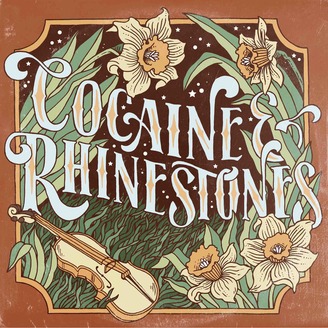 In late 2017, I went on a recommendation spree for Tyler Mahan Coe’s podcast about the history of country music, Cocaine and Rhinestones. It had sprung up out of nowhere as this fully-formed, beautiful thing. At the moment I became aware of the show, the most current episode was a close read of Merle Haggard’s “Okie from Muskogee” wherein Coe went deep on both the lyrical content and Haggard’s wider biography and public statements to determine just how literally the song was intended to be taken (a subject near and dear to me, since the a fight over the sincerity level of Hag’s culture-war songs once nearly broke up a band I was in). I love (older) country music and well-researched cultural history; the whole thing could have been cooked up in a lab by scientists working from extensive notes on how to craft the most enticing possible podcast for me.
In late 2017, I went on a recommendation spree for Tyler Mahan Coe’s podcast about the history of country music, Cocaine and Rhinestones. It had sprung up out of nowhere as this fully-formed, beautiful thing. At the moment I became aware of the show, the most current episode was a close read of Merle Haggard’s “Okie from Muskogee” wherein Coe went deep on both the lyrical content and Haggard’s wider biography and public statements to determine just how literally the song was intended to be taken (a subject near and dear to me, since the a fight over the sincerity level of Hag’s culture-war songs once nearly broke up a band I was in). I love (older) country music and well-researched cultural history; the whole thing could have been cooked up in a lab by scientists working from extensive notes on how to craft the most enticing possible podcast for me.
There are several specific things about Coe’s approach to Cocaine and Rhinestones that I admire and enjoy. One of them is his methodology; every episode features direct engagement with primary sources (the music itself, public statements by the artists and their families, police records, and so on), along with an admirably up-front assessment of the reliability of given sources (not all of Charlie Louvin’s stories hang together).
More than that, though, the show is built around a fantastic generosity of spirit. When the country music industry has been shitty to people on gender or ethnic lines, Coe calls the industry out. When a received story about a person has unfairly gained currency, Coe pushes back- for instance, his careful arguments against the idea that Buck Owens habitually screwed people over in business dealings, or that Wynnona Judd was a talentless puppet of producers. The podcast succeeds because, over and over, Coe meets artists where they are, taking their work in the spirit it was offered up. One of the defining features of country music is gatekeeping over the issue of authenticity, which Coe dynamites as a bullshit excuse to marginalize artists for no real reason. The very agreeable impression one gets from the show is of a very knowledgeable, passionate guy who loves music with an open mind and wants to tell you about it; when Coe announced a Patreon program to support the show because he wanted to make it his life’s work, it was a pretty easy sell. What music lover wouldn’t want to support this work?
I want to make this plain: in light of everything I’m about to say, I remain an all-in fan of Cocaine and Rhinestones. But it turns out that Coe has another podcast. The other one is a joint project with a guy named Mark Mosley; the show is called Your Favorite Band Sucks. The format is pretty much what you’d expect: each episode, the two of them pick a band and rail for 45 minutes or so about how and why the band sucks. Episode one was the Beatles. Episode two was the Rolling Stones. At this writing, they’ve just dropped one attacking the Beastie Boys. Previous targets have included U2, the Police, Sublime, Nirvana, Steely Dan, and Radiohead.
SOMEBODY GO BACK AND GET A SHITLOAD OF DIMES
or Postmodernism is Closer Than You Think
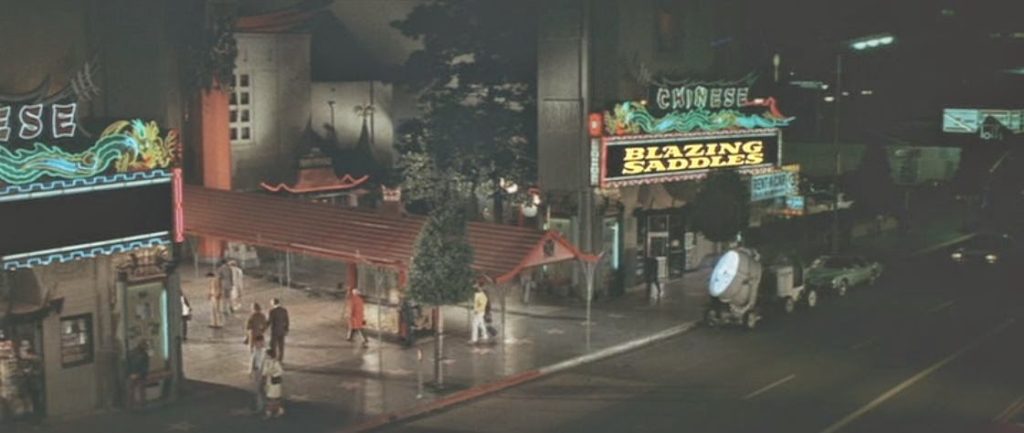
So, right now social media is aflame with talk of Jordan Peterson, the latest half-bright pile of mud to figure out that there’s money to be made telling angry young men that they’re right and special. Peterson and the controversy surrounding him are too dull to get into here, but I bring him up because part of his program includes bemoaning postmodernism and accusing it of destroying our morals, corroding society, corrupting the youth of Athens, yada yada yada.
I yada there because this isn’t a new thing. Howling incoherently about postmodernism has turned into a byword of the American right, especially its angrier, weirder wings (for instance, the vague acquaintance from high school, now blocked, who swooped into a facebook thread about the US withdrawal from the paris climate accords and told all of the participants that we were postmodernism-poisoned liberals and cultural Marxists who should kill ourselves). And I say “incoherently” advisedly; I just finished a master’s in art history, wherein I spent a lot of time talking and reading about postmodernism, and I can assure you that very little of it had to do with a vast liberal conspiracy to undermine the work of brave patriots like Alex Jones.
So what’s postmodernism? That’s a complicated thing to lay out, actually, for several reasons. For one thing, postmodernism manifests itself differently in different cultural spheres; architectural postmodernism isn’t exactly the same thing as literary postmodernism, and both are slightly different from postmodernism in visual art, and so on. This is a thing—THE thing—about culture, that answers are usually more complicated and boundaries more fuzzy than we’d like. But that’s the way it is. Anyway, in all of these spheres, postmodernism is (as the name would imply) a cultural reaction to modernism, which in turn was a reaction to (or at least existed in the context of) the romanticism of the late 19th and early 20th centuries. Again, I’m simplifying the hell out of things here, but hopefully in a useful way. Speaking really broadly, modernism was a push towards a theoretical rational order, often marked by form-follows-function minimalism. Think the paintings of Piet Mondrian, or the geometric glass buildings of Ludwig Mies van der Rohe, or the sparse, structured prose of Ernest Hemingway. The uniting theme here is a desire to pare things down to their essence, and (generally) to make the world make sense in terms of rational, quantifiable systems.
Postmodernism (once again, speaking really broadly) rose from the recognition that the world couldn’t really be contained, described, and modeled in the tight, orderly boxes demanded by modernism. And it can’t, for reasons too complicated to get into here, but 20th century developments in math, physics, and culture all ran into some kind of uncertainty or incompleteness on the outer fringes. (Thus, the squishiness of defining postmodernism is both ironic and kind of the point.) Where modernism implies (if often between the lines) a crystalline objective order to everything, postmodernism recognizes the semiotic implication that just about everything in human culture exists in relation to something else (this, I guess, is what drives the political right nuts, if they see it as a push back against tightly-strictured, clear, rational morality handed down by god; I submit that postmodernism isn’t really the problem in that model). Think of it this way: how do you define a word, any word? You do it through other words. Which in turn are defined by other words. It’s a giantic, neverending web of connections that sort of resembles the surface of a waterbed rather than a crystalline bedrock. Which sounds bad and confusing, but the good news is that by this part you’ve read more than 500 words-dependent-on-other-words about the subject and hopefully picked up some kind of informational content; in other words, it turns out that human culture gets along just fine without fixed points.
Anyway: a few hallmarks of postmodernism emerge from what I just said. One is a (usually) playful sense; you can think of postmodernism as a trickster Bugs Bunny character constantly tweaking modernism’s rules-bound Daffy Duck. Another, reflecting the whole interconnected-web-of-referentiality thing, is a propensity towards reference (see the previous sentence for an example; by the way, ever notice that Bugs Bunny is essentially an animated Groucho Marx, even repeating some gags?). Finally, especially in literature, architecture, and film/TV, postmodernism shows an obsession with form and playful tweakings of it.
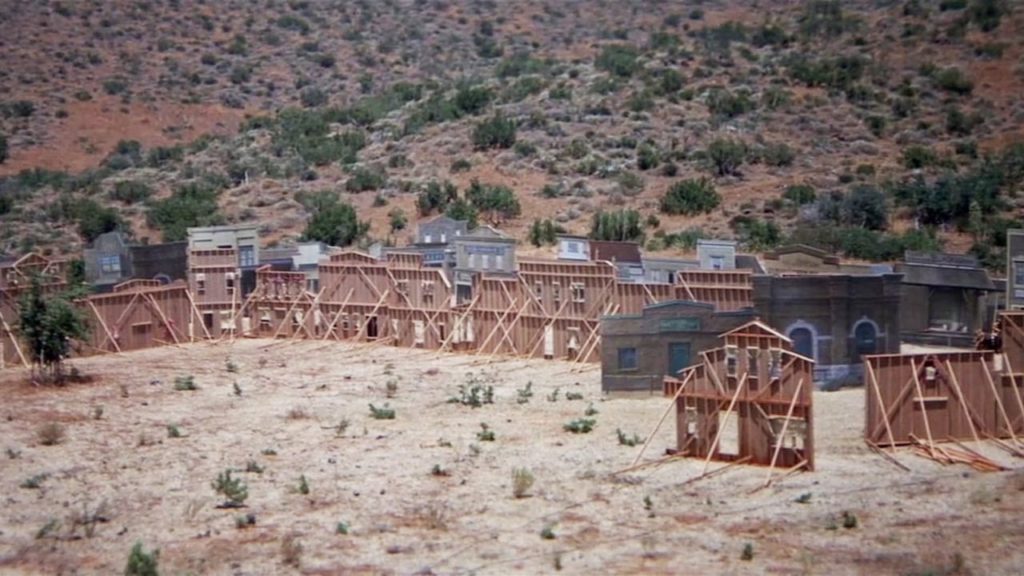
Which brings me back around to the American right. I’ve noticed a persistent love among people on the right for the movie Blazing Saddles. Jason Lewis, now a tea party republican congressman from Minnesota, often played the theme from Blazing Saddles during his time as a right-wing radio shouter in the Twin Cities. Conservative moaners about political correctness love to hold up Blazing Saddles as a movie that couldn’t be made today because the mean liberal scolds would kill it for being too un-P.C. The overlap between these people and people who decry postmodernism is for all intents and purposes total.
Which is dumb, because Blazing Saddles is a profoundly postmodern movie. It openly takes the constituent chunks of old-fashioned westerns and playfully remixes them, critiquing them in the process. This is the essence of postmodernism. It’s highly referential- some of the jokes don’t make sense unless you know about lawsuits Hedy Lamar filed. It deconstructs itself- look at the last act of the movie, where the action spills off of the set where the movie’s being filmed and takes over an entire movie studio. It’s hard to find a more postmodern moment than Slim Pickens, maybe-and-maybe-not breaking character, yells “Piss on you, I’m working for Mel Brooks!” before beating up Dom DeLuise. Honestly, if someone ever asks you what postmodernism is, you can give them a pretty good answer by just telling them to watch Blazing Saddles and think a little bit about what they’re seeing.
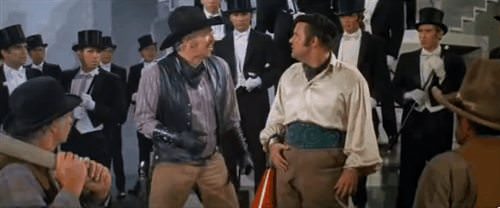
I’m not saying that Mel Brooks and his crew sat down and said “we’re going to make a movie that’s a massive exercise in postmodernism, and also includes fart jokes.” I’m sure they didn’t; that’s just not the way things work. Labels like these are almost always worked out after the fact, except for weird vanguardy cases where someone’s writing a manifesto. It’s more accurate that the cultural moment constantly moves forward and seeps into everything that’s created, and some time after the fact someone looks at it and says “yeah, that’s postmodernism” or “hey look, all of that stuff is similarly ornate, let’s call it baroque” or “boy, sure seems like some kind of rebirth, a renaissance if you will, happened in Europe there.” Postmodernism started popping up in at least the 40s and eventually came to be the dominant cultural mode of the west in the back half of the 20th century, continuing into today.
Which is to say that people moaning that postmodernism has made immoral soyboys out of all of us don’t know what they’re talking about. They are, ultimately, fish unknowingly complaining about the water they’re swimming in. And if, after complaining, they tune into any cultural product more sophisticated than Little House on the Prairie, they’re being pretty hypocritical.
(Postscript: since I brought it up and then just left it there, and someone’s bound to ask: the “it couldn’t be made today because it’s so un-PC” belief about Blazing Saddles has nothing at all to do with Saddles’ status as a profoundly postmodern movie. It’s a profoundly postmodern movie that happens to be about American race relations; Infinite Jest is a profoundly postmodern novel that has nothing much to say about race relations. Just because a work is one thing doesn’t mean anything about the other thing. Anyway, I don’t know that I buy that statement to begin with. The original possibility Blazing Saddles had a lot to do with Mel Brooks’ clout and production capabilities at that moment; the movie was pushing boundaries then, too, just as it would be now (even if the boundaries in question are different). Anyway, several movies come out every year that are more intentionally offensive than Blazing Saddles (and generally not as good). People who live in a world where multiple Human Centipede sequels have been filmed don’t have very strong legs to stand on when they talk about stuffy atmospheres stopping movies from being made.)
(Post-Postscript: another good moment of unacknowledged 1970s postmodernism was pointed out by pal Max Sparber, who observed how weird/great it is in the theme from Shaft that the backup singers get angry at the lead singer and then reconcile in admiration for the subject of the song, all within the text of the song itself.)
A BRIEF VISUAL WALK THROUGH THE HISTORY OF BLACK MILITANT IMAGERY
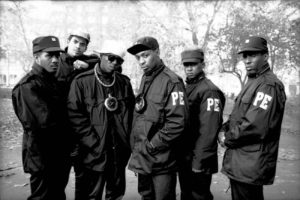
I’ve been a Public Enemy fan for a long, long time. They were one of my primary gateways into hiphop. Loved the production, the politics, the interplay between Chuck’s and Flav’s voices, the whole package. And the aesthetic. Let’s not kid ourselves, Public Enemy has a very distinct aesthetic.
It’s a very militaristic aesthetic. Uniforms, military signifiers, a lot of berets. The guys in the berets, of course, are the S1Ws (for “Security of the First World” in PE parlance). Theoretically, they’re PE’s security force. Functionally, they dance at shows and look cool at press events.
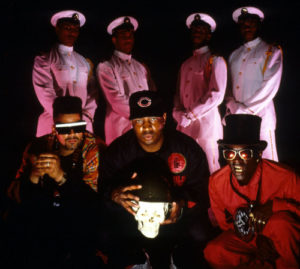
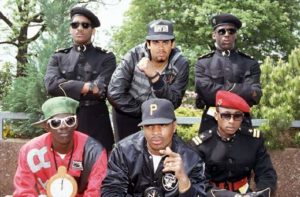
Anyway, Public Enemy is a smart band and Chuck D is a smart guy in particular. This isn’t random. This resonant look came from somewhere. It’s naggingly familiar.
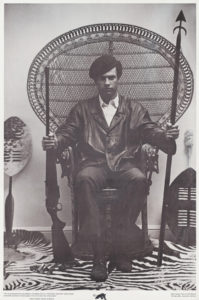
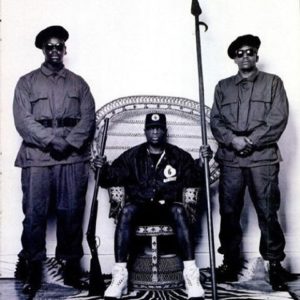
It’s naggingly familiar because it’s pretty much a direct visual quote of the distinct aesthetic of the Black Panthers. It’s clearly not an accident.
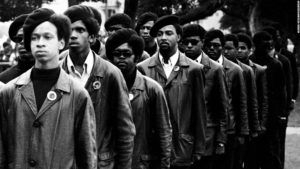
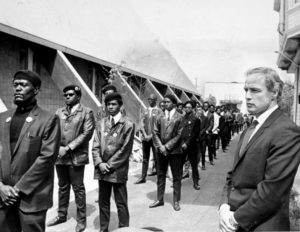
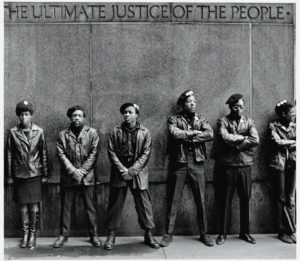
The Panthers, for what it’s worth, were very savvy about the use of imagery. They were great at mass communication; I’ve seen some fascinating presentations about their use of visual art in their newspaper.
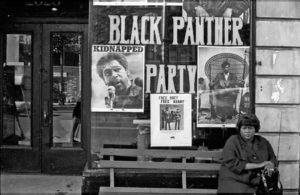
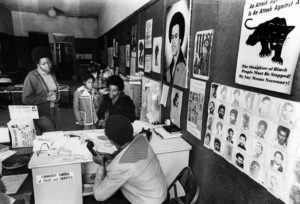
So, OK. A militant rap group borrowed some visual tropes from a militant political group. So what?
Well, the interesting thing is that the Panthers pretty clearly borrowed a lot of elements of their look – the military signifiers, the regimentation – from the Nation of Islam. If you’ve read this far, you probably already know who the Nation of Islam are; if you don’t, they’re a major combination Black nationalist/religious group. They have supporters and detractors, but you can’t really minimize their importance in the history of 20th century America.
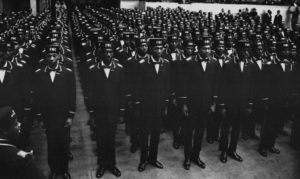
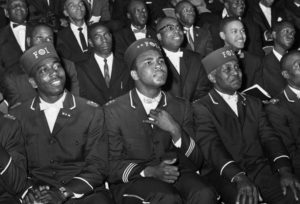
And here’s where it gets really interesting… the Nation of Islam, in their turn, clearly borrowed a lot of their imagery from Marcus Garvey, the pioneering pan-Africanist / Black nationalist who was active in the early part of the 20th century.
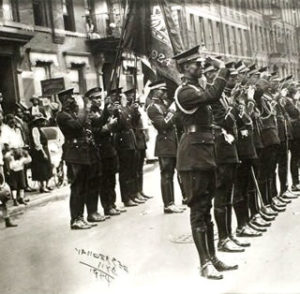
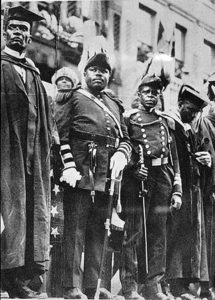
These pictures of Garvey are from 1924. The one on the right was taken by James Vanderzee, a prominent Harlem photographer.
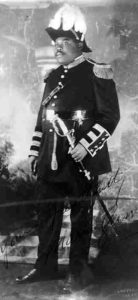
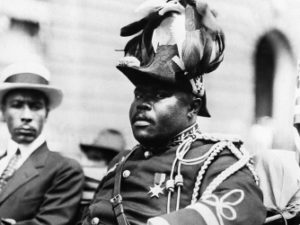
So, OK, we can trace this thread of visual signifiers for Black militancy back to the 1920s. What of it?
Well, here are some paintings of heroes of the Haitian revolution, the only successful rebellion by African slaves. Pretty obvious thing to hearten back to if you’re Marcus Garvey.

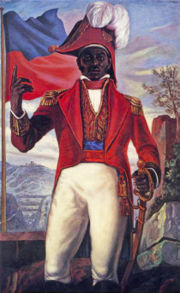

Pictured above, we have Toussaint Louverture, Jean-Jacques Dessalines, and Henri Cristophe. Those uniforms look a lot like the uniform Marcus Garvey was wearing, which of course inspired everything after.
(By the way, do Michael Jackson’s bedazzled military uniforms make more sense now? They should)
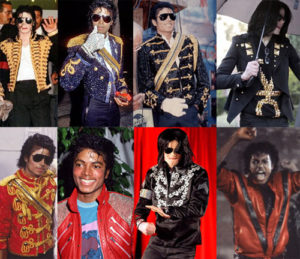
So… Public Enemy is old news. Barely a band now. What does this have to do with today?


Well, Beyonce’s 2016 Super Bowl Halftime show wasn’t that long ago.
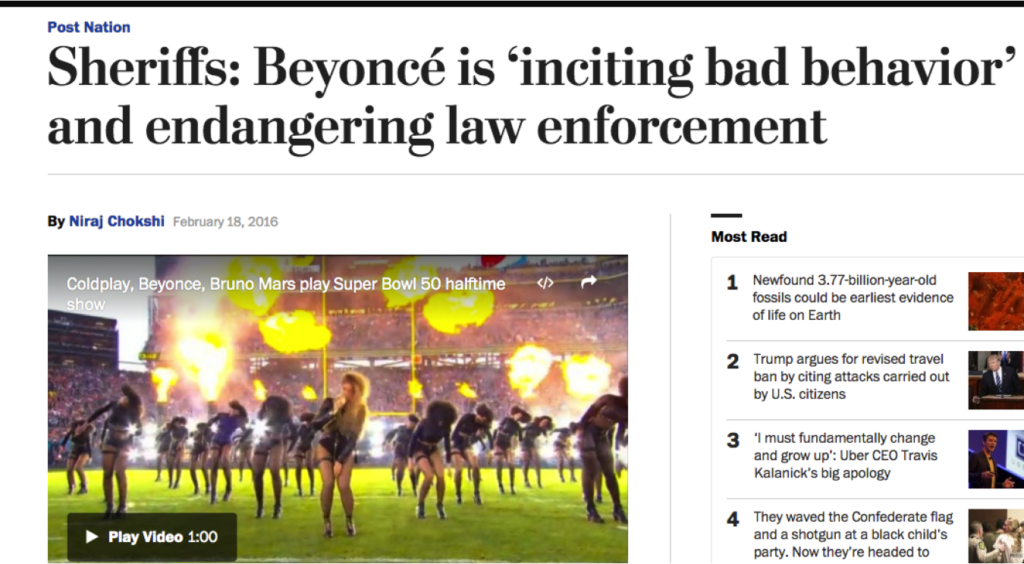
And that freaked some people right the fuck out.
This imagery is obviously still present, and still powerful.
–Fin–
Oh, but:


THERE AND BACK AGAIN, FOR ONCE
 One of the recurring themes of my adult life has been my getting the itch to go back and take a look at some book or movie or album that I loved when I was younger but haven’t re-engaged with for a while. The vast majority of the time, I walk away from the revisit shaking my head and telling myself that hey, it’s no crime to have liked something bad or silly when you were younger.
One of the recurring themes of my adult life has been my getting the itch to go back and take a look at some book or movie or album that I loved when I was younger but haven’t re-engaged with for a while. The vast majority of the time, I walk away from the revisit shaking my head and telling myself that hey, it’s no crime to have liked something bad or silly when you were younger.
So, recently I got the revisit urge for Lord of the Rings. I was pretty sure I knew how this was going to play out; I hadn’t read Tolkien since 2002, and I did vaguely remember not digging it at the last go-round. Which had been a bummer- these were foundational books to me in the 80s and 90s, but my turn-of-the-century reaction had been that the books were humorless, and trite, and just generally kind of bad.
A few things have happened to me since 2002, though. Big-picture, I’ve lived an adult life, with attendant ups and downs. More directly relevant, I’ve gained a historical consciousness, reading a ton of history (both cultural and political) and particularly boning up on World Wars 1 and 2.
And that’s the key. While I think there’s a lot of valid criticism that can be aimed at Lord of the Rings, I absolutely loved it on this reread, and a great deal of that love is based on my fascination with the way that Tolkien’s experience in World War 1 is smeared onto every page of the book (even beyond the physical descriptions of places around Mordor sounding almost word-for-word like descriptions of Western Front battlefields). Tolkien was at the Somme, arguably the most disastrous and harrowing British military experience of the 20th century. As he points out in the preface to The Fellowship of the Ring, by 1919, most of his close friends were dead. British tactics at the Somme were, essentially, to hop up out of somewhat-safe trenches in waves, charging into a maze of barbed wire covered by German machine guns. You’d watch the wave ahead of yours go over the top and get cut to pieces. And then the officers would blow their whistles and your wave would go. Tolkien survived the war because a serious illness brought on by lice bites took him off of the firing line. But he saw a lot of people he knew die. And, as a junior officer in WW1 infantry, he was trained to order men to immediate, useless deaths and display leadership by joining them.
Wicket Don’t Surf
ABOUT THE DEPARTMENT OF STAR WARS STUDIES
On one hand, I’m pretty tired of Star Wars as an omnipresent cultural phenomenon that’s now going to be marketed to death every year for the rest of our lives, and the behavior of hardcore Star Wars fandom often makes me want to poke my eyes out with chopsticks.
But on the other hand, the Star Wars movies are as close to a cultural lingua franca as we’ve got these days. Everybody knows them, everybody understands references to them, and so they make good universally-accessible subjects for critical thought. And for me, well, I was born in 1974, grew up watching the original trilogy, and then spent my early brain-tuning years obsessing over the movies like any late-80s/early 90s nerd; the critical faculties that I use now to argue about the role of science in the paintings of Thomas Eakins or the use of autobiographical comics as vehicles for the assertion of female identity, well, that all got started in thinking about how the first chunk of IV is pretty much a Western and why Han and Lando share so many of the same lines in V. Thinking about Star Wars is how I got started thinking about culture to begin with, so really, I’m just sort of coming home by thinking about it some more.
So the Department of Star Wars Studies is my catchall name for a recurring thing I’ll be doing where I poke and prod at Star Wars stuff and try to apply some of that fancy critical thought to a bunch of movies that usually feature a walking dog who flies spaceships.
Punch it:
WICKET DON’T SURF
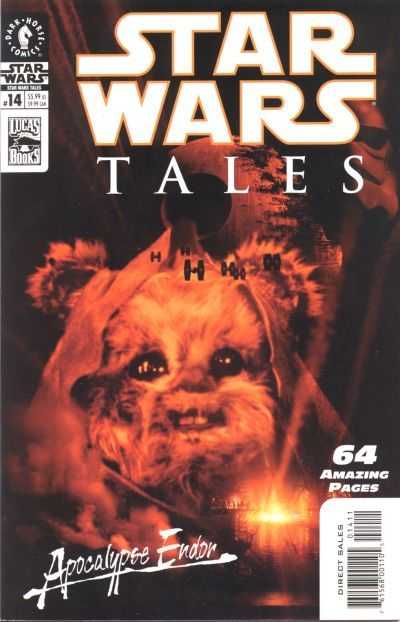
In 1983, George Lucas quietly entered the shit-stirrer hall of fame. The United States was still trying to figure out how to deal with the end of the Vietnam War, and was in fact about to kick off a decade of (retrospectively terrifying) cultural freakout about it. And in that milieu Lucas tricked the entire country into paying to go into theaters and root for thinly-veiled stand-ins for the Viet Cong.
I mean, think about it. In the last act of Return of the Jedi, the Empire has forces stationed on Endor, a place known for rough terrain filled with thick vegetation that impedes conventional open-field tactics and rewards hit-and-run ambushes. Imperial troops, with armor, laser blasters, speeder bikes, and various armored walkers (which are impractical but really cool-looking) have vastly more firepower and conventional training than the local insurgency they’re trying to put down, but the Ewoks overwhelm this superior conventional force with their guerilla tactics and knowledge of the local terrain. This is barely subtext; it’d be hard for it to be any more blatant. The parallels couldn’t be more clear, down to the fact that American forces suffered greatly in Vietnam from being built around theoretical open-field tank battles with Soviet forces on the plains of Europe; tanks don’t look as cool as AT-STs, but they’re clearly filling the same role of having their battlefield usefulness blunted by thick foliage and resourceful guerilla fighters.
You just have to be amazed at the politics of this. If the Ewoks are thinly-veiled stand-ins for the Viet Cong, what about the other side of that analogy? The Empire is the US. With the timing of this, there’s a curious historical hiccup: Return of the Jedi was released in May of 1983; Ronald Reagan first referred to the Soviet Union as the “Evil Empire” in March of 1983. So it’s not possible that Lucas was specifically tweaking Reagan’s usage with his US-Empire conflation, nor that Reagan was directly responding to it. But one of the strengths of Star Wars is that it is built out of easily-applied analogies, and both men were no doubt looking at bigger-picture parallels that were obvious to them (or their speechwriters, in Reagan’s case).
The Past is Another Country
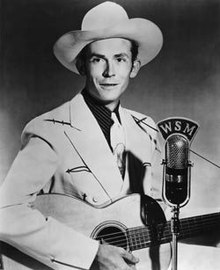
It’s hard to admit, but I don’t really have a lot of good memories of my mother, or much of a sense that I got any great legacy from her (except for being alive, which I guess, yeah, that does count for something). Mostly, I remember her needing stuff from me – a lot of going to the kitchen to fetch her drinks or cigarettes when I was younger; writing her resume, engaging in one of her ritual “debates” about the Kennedy assassination, or lending her money as I got older. And emotional validation all the way through.
On the cultural front, not much. She introduced me to Herman Wouk’s books about World War II, and that’s something that’s paid off in a bunch of ways throughout my life. So that’s a definite plus. Otherwise, almost nothing.
Except: my mother loved country music. Not the country music that was current when I was a kid – this was the 80s and early 90s, so I guess the current stuff at that point would have been Randy Travis and Garth Brooks – but the country music of her parents’ generation. We had this enormous 70s-vintage console stereo (turntable, radio tuner, and yes, an 8-track) and when my father wasn’t around she’d often put a Hank Williams or Johnny Horton record on and crank the fuck out of it. And the giant console stereo had giant console speakers, so when it cranked, it really kicked out the jams. And, like punk, classic country is music that really, really benefits from volume. Hank Williams and Johnny Horton (along with Roger Miller and sometimes Johnny Cash, and I’m sure a bunch of others) do this thing where they’re singing out at the very edge of what their voice can handle, and you can hear their vocal chords distort just like an overdriven guitar amp and it’s fucking glorious at extreme volume. And Hank’s wonderfully spare arrangements sound great when they can fill up a room with sound.
Devil Track Lake
KP|CIA
And here’s my first stab at a new direction after Nowhere Band. After reading and thinking about autobio comics a ton for my thesis work, I couldn’t resist making one of my own. And this is a story I’ve always wanted to tell. I wouldn’t bet against more of these coming out in the next few months.
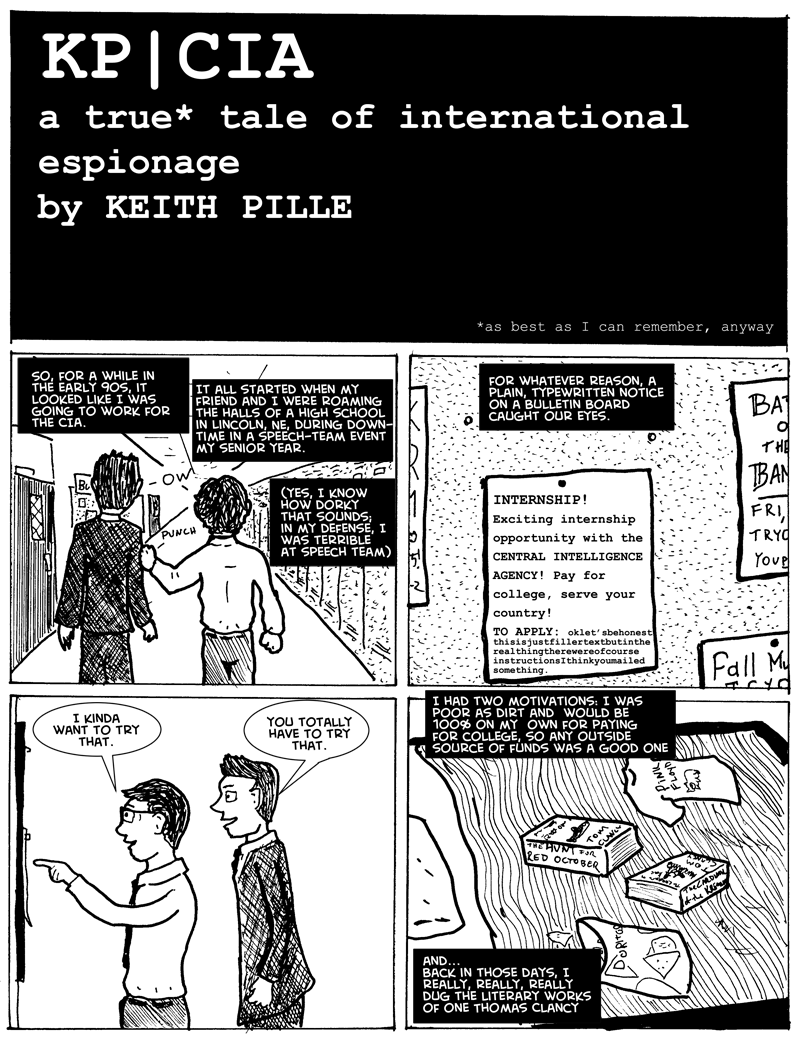
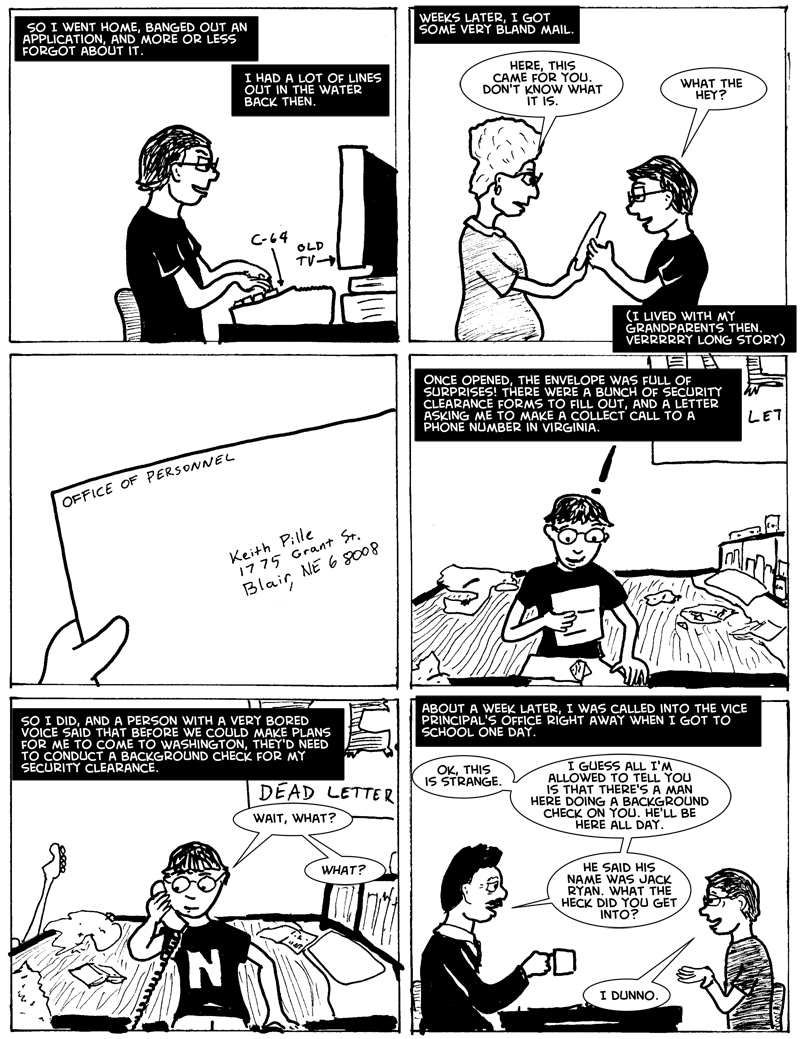


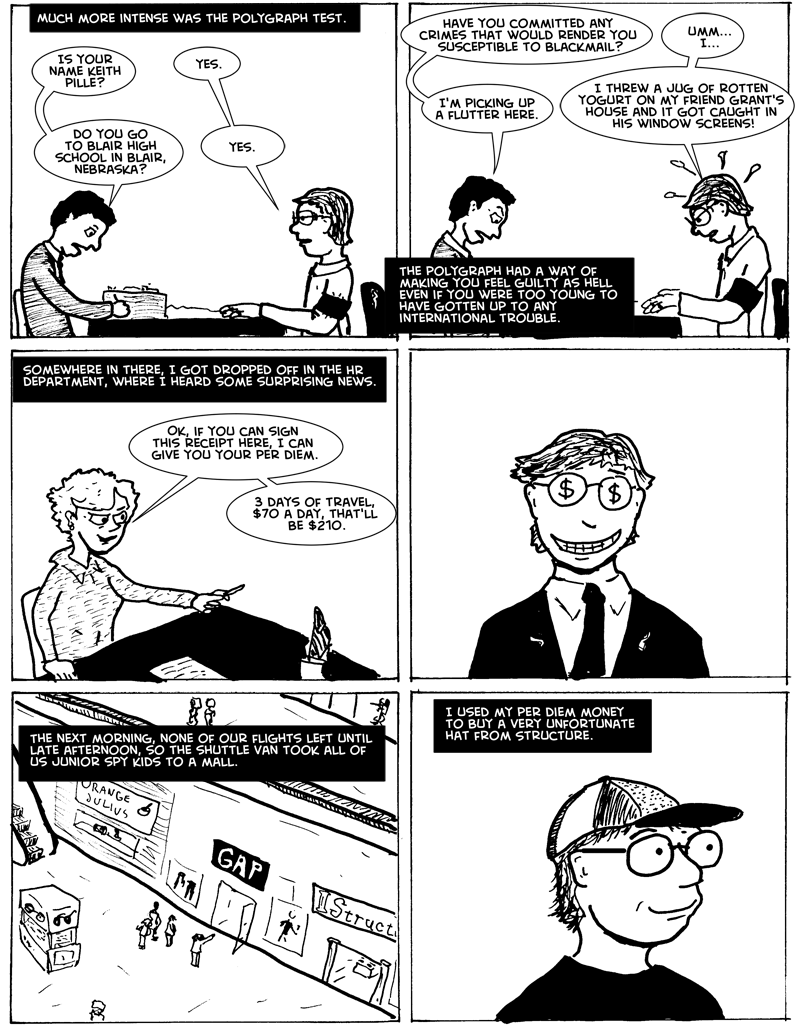


Tarot Sketches of the Major Arcana
So here’s another art project I’ve been working on for the past few months: drawing my way through the major arcana. I wanted an excuse to try some different stylistic stuff and not always have to draw guitars and drumsets (I didn’t count on finishing Nowhere Band before I finished this). Some of these are pretty rough, but I really like a bunch of them. I wound up learning a lot about artistic technique, archetypes, and a bunch of weird little bits of European history. So, good project all around.
I *might* go back and do more polished versions, at least of some of them. Not sure.
FWIW, my process was pretty simple: I looked up the Rider-Waite version of the card (since I like the style of them, and they seem to be default) and just sort of stared at it for a few minutes and then started drawing, trying honor whatever popped into my head at the moment.
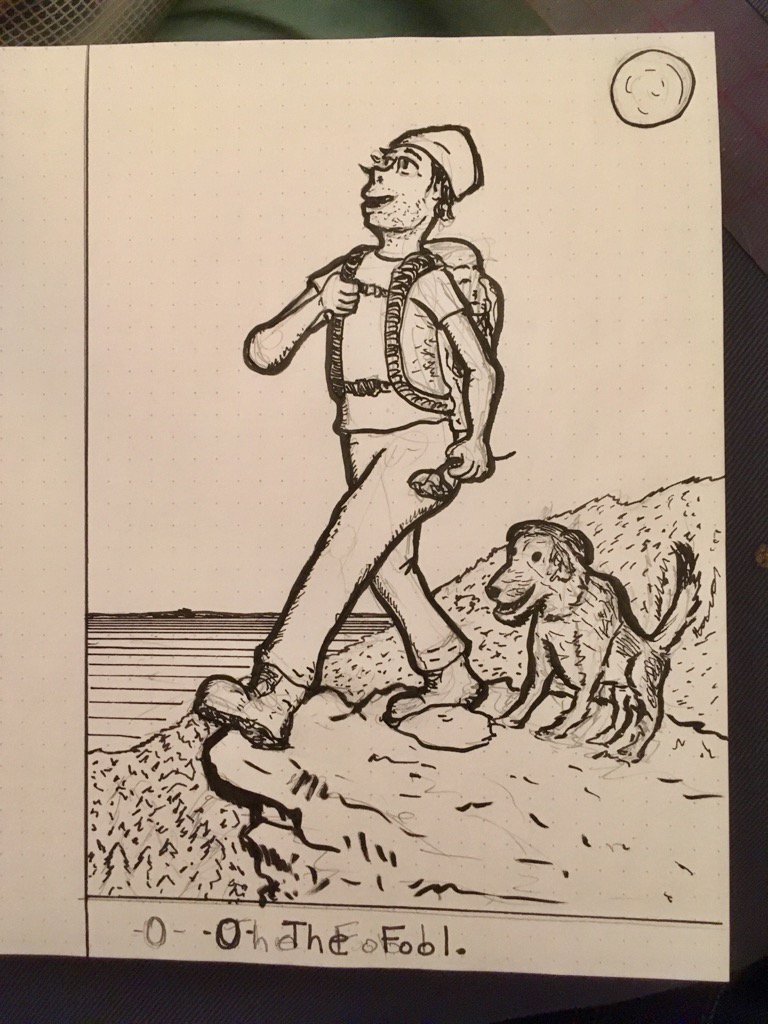
Do You Want to Know More? You Do Not.
 As I write this, it’s June of 2017, which means that I’ve spent at least the last 18 months preoccupied with politics at a level that I’d never matched before; and I was pretty preoccupied with politics before. But now, for me and big chunks of the rest of the country, it’s saturation level.
As I write this, it’s June of 2017, which means that I’ve spent at least the last 18 months preoccupied with politics at a level that I’d never matched before; and I was pretty preoccupied with politics before. But now, for me and big chunks of the rest of the country, it’s saturation level.
In this headspace, I reread Dune recently and started thinking about how often I see it cited as a novel that has things to say about politics. And to me, that’s a really interesting question to poke at. Can a book about future feudalism and giant sandworms really help us understand actual nuts-and-bolts politics in our mundane world? Looking beyond Dune, what about other novels that get mentioned as “political?” Is it that crazy to look to fiction for insight when we appear to be living out a William Gibson rewrite of the Johnny Gentle stuff from Infinite Jest?
So, then, here’s my overview of books I’ve read recently(-ish) with a “political” reputation. Looking at it, I’m keenly aware that it skews towards books by men, and science fiction. For the former, that’s definitely a problem; I’ve actively been trying for a couple of years to read more books by women, but it’s a case of a few years of active effort taking a long time to counteract the sausage party that results from decades of reading guided by systemic sexism. And for the latter, hey, no regrets: science fiction is a perfectly cromulent area of fiction.
With that in mind:
Dune, Frank Herbert
As I mentioned above, Dune has a reputation for being a political novel. But is it, really? The book’s largely about schemes and counterschemes (I think you could argue that Dune Messiah is more actively concerned with politics, or with a mixture of politics and its close cousin governance); the action consists of a move, a sneak attack, an escape, and then years of acculturation and training before a battle. But insight into politics does undergird all of this. Most especially, Paul Atreides’ realization that having the power to destroy a resource gives you control over it is an apt crystallization of a real principle from strategic power politics (CHOAM is modeled after OPEC, after all). Along the same lines, the discussion of the three-legged nature of the Imperial power structure, where the interests and capacities of the Imperial army, the combined armies of the Landsraad League, and the economic power of the Spacing Guild all press against each other to create a roughly stable equilibrium is another good demonstration of a real-world strategic power politics situation. Moreover, Duke Leto’s exhausted dismissal of his own use of propaganda to win public loyalty doubles as an nice observation of the power of cultivated image (especially when contrasted with the just-below-the-surface examination of how the Harkonnens propagandize their own population in the chapter where Feyd-Rautha fights in the arena). This look at propaganda extends into a discussion of loyalty and how it is earned.
Overall, Dune winds up having a lot of good nuggets that may or may not add up to anything useful; it’s hard to imagine Donald Trump reading Dune and coming out of it any better at his job.
A Song of Ice and Fire (series), George R.R. Martin
I understand (and share) many of the frustrations and qualms about Martin’s series. But the fact remains that, buried in the thousands of pages of text are a great many astute observations about power, persuasion, and governance. The two core goals of the series are an examination of political systems and a deconstruction of standard fantasy tropes (I’d argue that the TV series retained both of these more or less by accident for a while, in greatly watered-down form, before just ditching them in the name of streamlining into an action-adventure narrative).
A Couple of Comics about Music Production
What the title says. Made these as sort of a detour from narrative Nowhere Band strips, but they don’t really belong over there. So here they are. Will probably do more at some point….
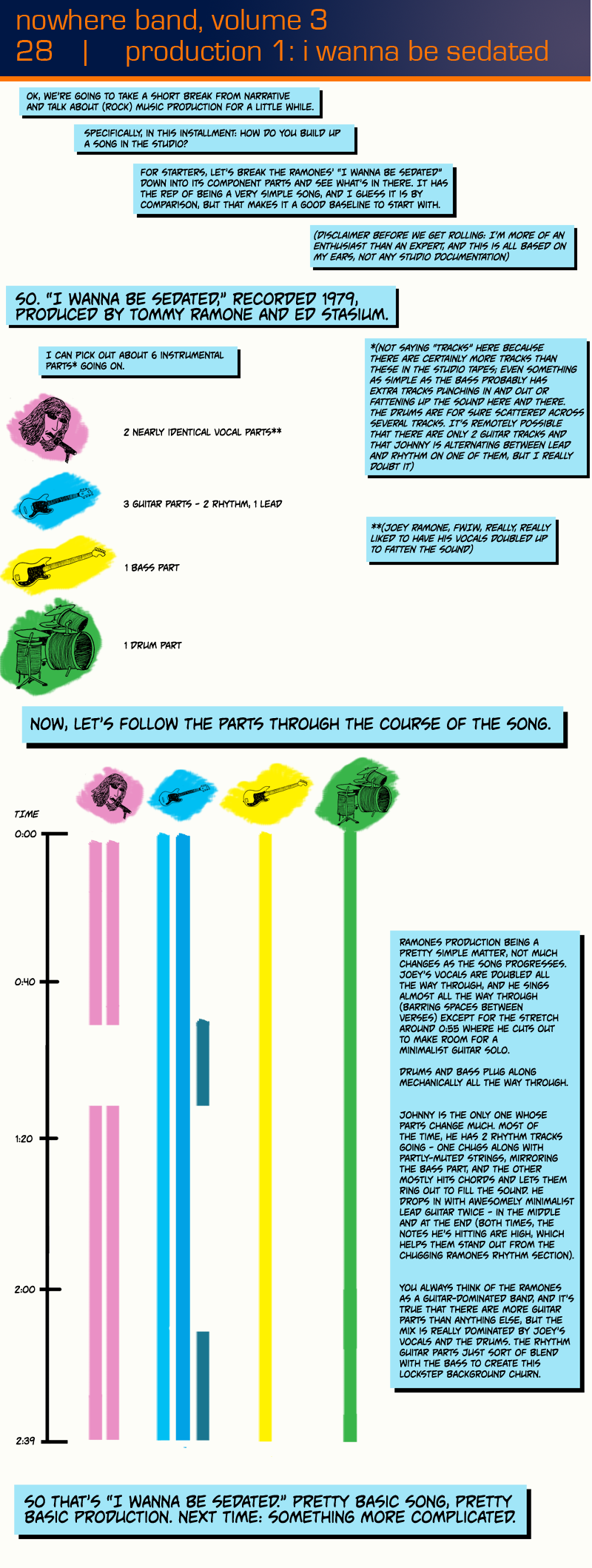

DAVID BOWIE IS__ A BIT OF AN INTERPRETIVE MUDDLE, BUT PRETTY WORTHWHILE IN THE END IF YOU’RE INTO THAT SORT OF THING
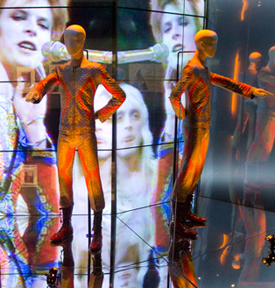 This was originally written as a paper for an art history class in curation.
This was originally written as a paper for an art history class in curation.
Last year, my birthday fell shortly before David Bowie Is, the “first retrospective of the extraordinary career of David Bowie,” closed its run at the Museum of Contemporary Art in Chicago. My wife surprised me with tickets to the long-sold-out show. We packed for a crash road trip, hopped into the car, and drove from Minneapolis to Chicago, listening our way with mounting excitement through the entire Bowie oeuvre during the 10-hour trip.
Viewing the exhibit was an overwhelming rush; the line to enter the museum had stretched around the block. The show was designed to hit attendees through multiple senses – as one walked through the space looking at objects, a location-sensitive headset would blast music or interview clips related to the object under view. The crowd itself – packed into the galleries as tightly as the fire marshals would allow – provided a constant buzz of energy as several rooms full of Bowie superfans communed with artifacts connected with the great man.
We left the exhibit exhausted and happily dazed. But on the drive back to Minneapolis, questions started to bubble up as we talked it over. What had we learned in that exhibit? It didn’t really seem like we’d gotten much in the way of new information. The experience had been intense and fun, but had there been an intellectual point? Had the whole thing really been an enjoyable but ultimately empty wallow in pop idolatry? As months passed and the undigested bolus of David Bowie Is lingered in my head, a slow, slinking surety settled in that it had all been a lot of sound and fury, signifying nothing.
The Many Cars of Keith Pille
(this is an updated version of a piece I originally wrote in 2004; it was updated again in September of 2016. Hopefully it will not need to be updated yet again for a while)
1. 1978 Dodge Warlock pickup
Period of use: December 1990- early 1991
Comments: customized for racing on the dirt tracks of rural Oklahoma; idled at 35 mph, requiring constant use of the brakes while driving. Famous throughout Blair, Nebraska for glasspack mufflers which allowed the truck to be heard over a mile away and for gas mileage below 10 mpg. Lacked rearview mirrors of any sort.
 Eventual fate: sold due to constant mechanical problems of varying magnitude, shortly before a massive systemwide collapse left it looking like Sheriff Buford T. Justice’s car at the end of Smokey and the Bandit.
Eventual fate: sold due to constant mechanical problems of varying magnitude, shortly before a massive systemwide collapse left it looking like Sheriff Buford T. Justice’s car at the end of Smokey and the Bandit.
2. 1982 AMC Spirit
Period of Use: early 1991- March 1993
Comments: one of the curiously large “compacts” of the early 80s. Much-beloved and far more reliable than the truck, although hardly free of mechanical trouble (the driveshaft fell off during one drive to Omaha; the clutch burned out on a country road). At one point my father installed a dashboard 8-track, against which I railed vigorously.
Eventual fate: retired from service after chunk of transmission housing broke off and fell into clutch assembly.
I’m A Punk Rocker Yes I Am | A Meander
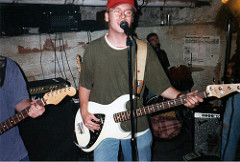
As I write this, I’m about halfway through a master’s program in art history. And for the most part, I like it a lot. I like being exposed to new art and new ways of thinking and being able to get into deep discussions with smart people about works of art and lesser-known artists.
There is a side of it I don’t like, though – one that doesn’t come up in class too often, but dominates when I’m talking to people outside the program about it. If I mention that I’m studying art history, people naturally seem to want to jump to talking about classifications. Is Van Gogh impressionist or post-impressionist? Is Frank Gehry a deconstructionist architect?
I know there’s some value to that kind of discussion, but I think it’s minimal. It’s more interesting to talk about Frank Gehry’s architecture itself than whether it fits into an arbitrary category (a category made up, in this case, retroactively for a museum exhibit, borrowing a really unrelated term from lit theory). And more importantly, these discussions remind me of another ongoing argument that’s been annoying me for years: is Motorhead’s “Ace of Spades” a punk song?
Rough Mixes of Vandalized Husker Du Songs
So, the desire to transform Husker Du songs in weird acoustic ways just seems to be this year’s obsession (see the last post, ferinstance). As threatened there, I’ve gone further down this road. Here are rough mixes of ganked-up versions of Celebrated Summer (yeah, again, but with more thought into the arrangement on this one) and Powerline. These mixes aren’t final at all, but they’re good representations of works in progress. There will probably be more of these, and for that I apologize.
Maybe my apology should take the form of an acoustic cover of I Apologize.
Celebrated Summer
Powerline
Celebrated Summer
A while ago, I gave one of my favorite Husker Du songs the Leo Kottke treatment:
I might end up doing some more of these. God knows I know a lot of Husker songs.
A Walk Through the Process of Creating Nowhere Band
A couple of friends have asked me about the nuts and bolts of how I put a Nowhere Band strip together; I’m in kind of a dead spot as I recover from a vacation and wait for class to start, so I thought now would be a good time to do a quick walkthrough of the process. So (click on all pictures to embiggen):
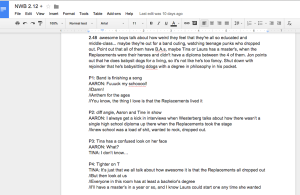 STEP 1 : SCRIPT
STEP 1 : SCRIPT
Naturally, I start with a script. Actually, that’s not true. I start with a vague idea that gets jotted down in a notebook or a google doc, and then fluffed out to a badly-written paragraph with chunks of dialogue embedded, and then on to a full-on script.
My scripts are pretty minimal (and casual as far as spelling and grammar and those niceties), since I’m just writing for myself and I’ve already internalized all kinds of strip conventions about locations, expressions, gestures, and such. At this point, it’d be really weird to write a script for someone else to draw. I should try it some time.
The hardest thing in the script stage is making sure lines of dialogue don’t get too long to fit gracefully into balloons. I can get pretty wordy – I still basically think of myself as a writer who sort of knows how to draw – so this is a challenge.
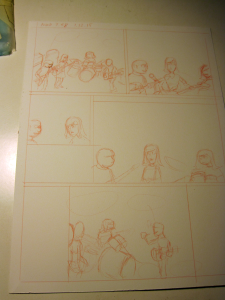 STEP 2 : REDLINE
STEP 2 : REDLINE
This is the worst step; in any sort of creative work, the hardest part is sitting down and facing a blank piece of paper, and that’s what’s going on here. Everything after this point is basically a form of editing and refinement, cleaning up or enhancing something that already exists. Here, I’m wrestling something into existence. Mornings when I wake up and have to go downstairs and do redlines are the times I’m most tempted to sleep in or volunteer to walk the dog on Rebecca’s day of the rotation.
Anyway: I start out by laying out the panel grid in red pencil (doing this stage in red makes it easy to remove all of this rough early work in Photoshop once the strip’s scanned). The script’ll tell me how many panels I need (I try to keep it around 5, give or take a couple, but different strips need different lengths). Relative panel size usually comes down to a function of how much dialog is in a given panel (remember, I get wordy), how big a thing or space needs to be shown, or how many characters appear.
Continue reading A Walk Through the Process of Creating Nowhere Band
Rumours
This is one of the first long-form comics I ever drew, back when I was pretty clearly just beginning to learn how to draw. It’s an adaption of an excellent essay / short story by Twin Cities music writer Jim Walsh, who was nice enough to let me take his words out for a spin. Resurrected because Fleetwood Mac seems to be having some kind of goddamned renaissance.
All This Sounds Past
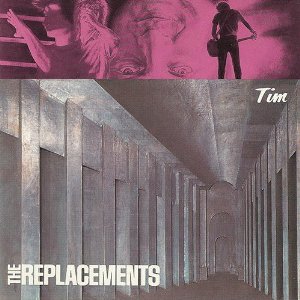 The other night, while cooking dinner, I listened to the Replacements’ Tim. It’s one of those weird cases where Tim’s been one of my favorite albums for decades, but between the march of time, the constant ingress of new music, and my slow disengagement from the practice of listening to albums straight through, it’s actually been years since I’d listened to the whole thing straight through.
The other night, while cooking dinner, I listened to the Replacements’ Tim. It’s one of those weird cases where Tim’s been one of my favorite albums for decades, but between the march of time, the constant ingress of new music, and my slow disengagement from the practice of listening to albums straight through, it’s actually been years since I’d listened to the whole thing straight through.
Now, I can’t claim to be unique in being a middle-aged white guy in south Minneapolis who has Tim in his Pantheon of Great Albums. The conventional wisdom with the Replacements has always been that the 3-album sequence of Let It Be, Tim, and Pleased to Meet Me represent the band’s apex. I never quiiiite agreed with that (I think Hootenanny’s more fun than Let It Be), but it’s definitely been a settled matter in my head for a very long time that Tim was one of the best albums by one of my all-time favorite bands.
So it was really weird to be cutting vegetables, drinking a beer, and thinking that Tim actually kind of drags in a lot of spots. There are great songs, for sure, and the album works really well as Bob Stinson’s last stand. Buuuut. “Hold My Life” never really did sit well with me as the rockin’ opener to a rockin’ album. And the production here is terrible all the way through, even if a Ramone was doing the production.
And hey- isn’t “Here Comes a Regular,” while an undeniably great song, kind of self-pitying? Westerberg’s singing this elegy to his own life, when the Replacements were notoriously self-sabotaging. That’s… it’s not the end of the world, it doesn’t ruin the song, but it does really color the whole Replacements thing. Self-destruction isn’t as fun when paired with self-pity.
So as my spaghetti sauce simmered, I recognized that, at least in this case, you can’t really go home again to music that you loved when you were younger. Listening to Tim as a 39-year-old homeowning cartoonist just inevitably creates different associations than approaching the album as a 25-year-old bass player in a shitty apartment in St. Paul who’s convinced that music semistardom is right around the corner as soon as the correct mix of onstage drunkenness and energy gets worked out. I still do love Tim in particular and the Replacements in general, but it’s changed.
I’ve long believed (this is the one useful thing that I got out of Zen and the Art of Motorcycle Maintenance) that art actually happens at the intersection of the work and the person experiencing it. If I’m a different person now than I was 15 years ago (and I’m pretty comfortable making that statement) then there’s a different thing going on when the person interacts with the work.
I don’t know. I try not to view everything through the lens of the past. But then again, as we get older, past is one thing we steadily have more of.
Longevity and Comics and Who the Hell Knows What Else
OK.
I’ve been talking on and on all summer about wrapping up Nowhere Band this year. The idea was pretty simple: I’m turning 40 at the end of the year, and on some level it felt weird to me to think about continuing to do a strip about dudes in a band after I’d turned 40. Especially since it’s been a good 3 years since I’ve had an active band going. There was a bunch of burnout involved as well, much of it centered around a bunch of rules I’ve imposed on myself.
But now that I’ve thought things over and life has calmed down a bit, I think I’m going to keep the strip going. Part of what convinced me was the abrupt realization that some of my favorite comics are Jaime Hernandez’ ongoing run; he obviously didn’t feel weird about making comics about aging punks as he whizzed past 40, so why should I? Also, I recognized that lots of the things that were bothering me were completely self-inflicted. Tired of fighting with Photoshop in the coloring stage? You can always go back to black and white for a while. Feeling pressed by self-imposed posting deadlines? Who gives a shit? It’ll come out when it comes out. Don’t want every story to center on the band? Fine, they all have outside lives, tell some stories there.
The truth is that I do love the strip. Somehow, sneakily, it seems to have become my life’s work. I can live with that. I didn’t mean for it to be when I started out… but at least for now it feels like that’s where things are. I guess that gives some shape to my 20s- I wasn’t wasting my time in half-assed bands, I was gathering material. You always wish more people read a strip when you put this much work into it, but I love the readers that I have. people whose tastes and worldviews I respect tell me they like it; that means a ton to me.
So I think I’m going to keep going. I might structure things so that stories or even sections of life have clear starts and ends, but that’s the sort of thing that’s easy to say you’re going to do and then forget. So we’ll see. And I’m sure that there will be breaks and hiatuses at points as I work on prose stuff or other comics. But for the time being, Nowhere Band’s going to chug on. Even if (gasp) the Awesome Boys don’t, necessarily.
The Doctor Is In
Here’s a comic strip I worked up, kind of a prototype for a thing I might pursue after I finish Nowhere Band (which should be some time this year, unless I change my mind). I think this thing would mutate a little more if it actually went into production, but if nothing else I’ve got a pretty big google doc full of script ideas…
And yeah, inspired by Charles Schulz, of course.
Updated: I did indeed change my mind.
Catonia Lends a Hand
Me on Slate on Tom Robbins
I’ll probably write a bit more about this later, but I wanted to note that I’ve got a longish essay up over on Slate about my younger infatuation and then partial disillusionment with the work of Tom Robbins. I like the piece a lot, and I’ve wound up having a bunch of interesting conversations about it on Twitter and that other, shittier, social media platform.
Publisher’s Statement from Chain-Fighting Prospectus #1
Publisher’s Statement, from Chain-Fighting Prospectus #1
by Roger Ehrman, Publisher*
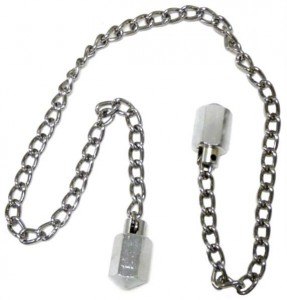 I’m sure we all have a few cherished memories from the glorious days of chain-fighting in our youth. For me, it’s something of a toss-up between two extremes. On one hand, there’s the big-league memory of the day in 1963 when prohibitive underdog Joe Oberg stared into the cameras and guaranteed a victory over Tiny Wallace, and then broke out all of the champ’s teeth on the second swing of his anchor-chain. Stirring, indeed, but equally golden in my mind are all of the Sunday afternoons when I went with my father out behind the Amoco on the outskirts of Mason City to watch the amateur chain-fights; certainly not as glamorous, but it taught this young man a great many lessons on how a man faces pain. And in that light, I think I can be forgiven for waxing a bit sentimental.
I’m sure we all have a few cherished memories from the glorious days of chain-fighting in our youth. For me, it’s something of a toss-up between two extremes. On one hand, there’s the big-league memory of the day in 1963 when prohibitive underdog Joe Oberg stared into the cameras and guaranteed a victory over Tiny Wallace, and then broke out all of the champ’s teeth on the second swing of his anchor-chain. Stirring, indeed, but equally golden in my mind are all of the Sunday afternoons when I went with my father out behind the Amoco on the outskirts of Mason City to watch the amateur chain-fights; certainly not as glamorous, but it taught this young man a great many lessons on how a man faces pain. And in that light, I think I can be forgiven for waxing a bit sentimental.
There are those who say that chain-fighting has fallen from those hallowed days, that the cable TV deal and the Snap-On Tools sponsorship have robbed the sport of something essential. These purists are certainly entitled to their opinions, but I feel that they are missing the point. Chain-fighting is about two men, eight feet of linked metal, and the raw will to compete; nothing more, nothing less, and no TV deal will change that.
Chain-fighting is as vital and energetic today as it ever has been. Indeed, I would argue that chain-fighting is poised to enter a new, golden age as we begin the Twenty-First Century. Witness the revolution sweeping the sport in the wake of Magnus Thorsson’s groundbreaking two-handed swing technique. Or the team at Stanford investigating the introduction of ringside epidurals. Or the wave of exciting new chain materials– including ceramics– coming out of Japan, truly stretching the boundaries of what chain-fighting is and can be. I am firmly convinced that, for those of us in the happy fraternity of link-swingers, the road ahead has never been brighter.
Continue reading Publisher’s Statement from Chain-Fighting Prospectus #1
America’s Next Top Novelist
The comic project I did back in 2007 immediately before starting Nowhere Band. I think this was a good script, but my art skillz were clearly still a work in progress. Note that I borrowed a couple of character designs for NWB.
Bleeding Edge Has Been Keeping Me Up At Night
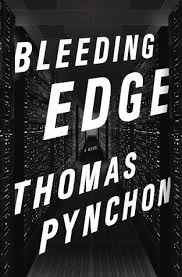 After powering through Bleeding Edge, Thomas Pynchon’s latest work, I keep finding myself having trouble getting to sleep because big chunks of my brain were still engaged with analyzing the book. And it’s great to be so caught up in a book, but the lack of sleep is becoming a pretty big bummer. So I thought I’d try to capture some of this in writing in the hope of getting some goddamned rest.
After powering through Bleeding Edge, Thomas Pynchon’s latest work, I keep finding myself having trouble getting to sleep because big chunks of my brain were still engaged with analyzing the book. And it’s great to be so caught up in a book, but the lack of sleep is becoming a pretty big bummer. So I thought I’d try to capture some of this in writing in the hope of getting some goddamned rest.
This isn’t by any means an attempt to put together a coherent analysis; coherent analysis of Pynchon is a mug’s game, especially when you’re going on only one read-through. But a bunch of things jumped out at me, and they’re all similar enough to suggest a kind of overarching intentional pattern.
More than anything else, Bleeding Edge seems to me to be about disappointment. Disappointment in the way the United States has reacted and changed since September 11, and disappointment in the slow but steady shittification of the Internet (and there’s an enormous amount of overlap between these two disappointments; we’ll get to this later, but in the meantime ask Edward Snowden). I might be projecting my own shit onto the book here, but I don’t think so (of course, you never do).
Continue reading Bleeding Edge Has Been Keeping Me Up At Night
BULLETIN: ENGLISH DEPARTMENT COURSE ADDITIONS FOR SPRING SEMESTER
In response to requests from recent graduates who felt that their studies here did not properly prepare them for the realities of the working world for writers in the current market, the Department of English is pleased to announce the following slate of new classes for the Spring semester (registration preference will be given to seniors nearing graduation):
ENGL 304: TV RECAPS
(optional lab: ENGL 305, Snarky TV Livetweeting)
Episode-by-episode recaps of popular television shows are one of the hottest – some would say the only – growth sectors for young writers entering the market. In this class, students will receive hands-on instruction in the delicate art of writing 1500-word recaps of TV episodes to post to entertainment websites to attract search engines and spur long, heated discussions in the comments. Special attention will be paid to identifying and coining derisive nicknames for “good” and “bad” characters on reality shows, and to working up witty in-text rejoinders to things said onscreen.
In the optional lab, students will gain practice tweeting sarcastic responses to TV shows as they air, with emphasis on making up catch hashtags. #RequiredTextDuckDynasty
Continue reading BULLETIN: ENGLISH DEPARTMENT COURSE ADDITIONS FOR SPRING SEMESTER
The Very First Cartoon I Ever Drew
The Bust-Up: The Clash
In this periodic feature, I’ll take a look at the endings of bands with interesting flameout stories.
The more I learn about the Clash, the more convinced I am that their implosion is a lot like the reentry burnup of the space shuttle Columbia– the fiery, visible disaster was just the inevitable result of seemingly innocuous events that happened quite a while before.
In the case of Columbia, a chunk of foam insulation broke off of the shuttle’s external fuel tank during launch and smacked into the ceramic tiles that comprised the craft’s heat shield. These “foam strikes” were common events during shuttle launches, and were considered no big deal. Columbia made it into space and spent 2 weeks in orbit conducting business as usual. Then, as the shuttle broke orbit and glided through the atmosphere at Mach 24, the heat shield failed where the foam had struck. At the speed the shuttle was travelling, this was fatal; the craft wrenched itself to pieces, and the wreckage burned itself down to the ground.
And so, the Clash. I think they were pretty much cooked the second they signed their contract with CBS. Mark Perry of the fanzine Sniffin’ Glue famously said that “Punk died the day the Clash signed to CBS;” I’ve never agreed with that sentiment, but I do think that the signing of that particular contract started a countdown that led, more or less inevitably, to a rump version of the band releasing a farewell album so terrible that polite society has chosen to pretend it doesn’t exist.
I’m Great at Missing Things
…so it took me a mere 4 years to stumble across this i09 post (by Greame McMillan, who I have thought was awesome for a long time) praising my McSweeney’s COBRA stuff. Which just hits me as funny because this is turning into a trend, my finding stuff like this months or years later. Awesome to stumble across now – it’s been a rough day, so it’s a good time to come across something positive – but it’s weird to me how great I am at missing things.
It Ain’t Easy (in the Country)
As part of a group remake of The Rise and Fall of Ziggy Stardust, I have committed some pretty serious crimes against Bowie:
In my defense, a) It Ain’t Easy is easily the worst song on the album (Bowie’s version only works because he’s got Mick Ronson there to save the day), and I basically had to destroy the village to save it; b) Bowie didn’t write the damned thing anyway (which really shows in the lyrics, which are pretty Zeppelin); and c) I actually think my guitar parts are pretty cool.
This alternate version from the same challenge is also pretty excellent.
Kirk and Picard were both on the hook for a bunch of these…
 UNITED FEDERATION OF PLANETS
UNITED FEDERATION OF PLANETS
FORM TST-6- TEMPORAL DISPLACEMENT IMPACT ASSESSMENT (PAST)
for temporal displacements to the future, file form TST-7a
Filing officer information
Name:
Rank:
Starfleet ID:
Duty vessel:
Stardate of initial temporal displacement:
Stardate temporally displaced to:
Stardate returned to, if applicable:
Displacement involved (circle appropriate): ship / crew / both
Displacement was (circle appropriate): accidental / intentional
Number of Starfleet personnel displaced:
Number deceased while displaced:
Number of non-Starfleet individuals displaced:
Number deceased while displaced:
Answer these questions as completely as possible:
1. List all past-resident individuals encountered during displacement (using red pen, circle names of all past-resident individuals killed during displacement):
2. Using a 1-6 scale (1 unimportant, 6 critical), rank all individuals listed in question 1 in terms of their importance to known history:
3. Describe, in as much detail as possible, all interactions with past-resident individuals during displacement (attach additional sheets if needed):
4. Was any knowledge of future events or technology imparted to past-resident individuals during displacement?
If yes, list future events or technology discussed:
5. Were any present-resident individuals left behind in the past?
If yes, list their names and (if relevant) Starfleet IDs:
6. Were any past-resident individuals brought forward to the present?
If yes, provide as much identification data as possible:
7. Were any physical technological artifacts from the present left behind in the past?
If yes, list:
8. In your professional opinion, is it likely that a branching timeline was created by this displacement?
If yes, is it likely that this timeline is dystopian?
9. Rank, on a scale of 0-6 (0 is minimal, 6 is severe), your impact on the course of known history during the displacement:
THANK YOU FOR YOUR COMPLIANCE WITH STARFLEET TEMPORAL DISPLACEMENT REGULATIONS. YOU WILL BE CONTACTED FOR FURTHER DEBRIEFING WITHIN 10 BUSINESS DAYS OF SUBMISSION OF THIS FORM.
The Best Idea I’ve Ever Had
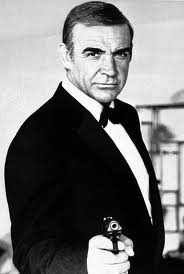 SCENE: A strip club on ladies’ night. Music’s booming, hunks are prancing around onstage in the standard Chippendales collar-cuffs thing. In the crowd, towards the back, we see a woman who is clearly some sort of arms dealer or terrorist or something terrible, here to conduct some business while taking in the show.
SCENE: A strip club on ladies’ night. Music’s booming, hunks are prancing around onstage in the standard Chippendales collar-cuffs thing. In the crowd, towards the back, we see a woman who is clearly some sort of arms dealer or terrorist or something terrible, here to conduct some business while taking in the show.
Camera swings back from her to the stage, focusing on one dancer in particular. The music shifts subtly – why, what is that familiar theme it’s moving around?
Suddenly, the dancer in question raises his hands to his neck AND RIPS OFF HIS LATEX CHEST TO REVEAL A TUXEDO UNDERNEATH (which is connected to the collar and cuffs of course) AND OH SHIT THAT’S THE JAMES BOND THEME THAT’S PLAYING AND THEN BOND PULLS HIS GUN AND MOWS DOWN THE BADDIES AND GOD DAMN WHAT AN IDEA.
Eschaton (and me) in Outside Magazine
So, it turns out that last year I figured fairly prominently in an Outside Magazine article about the semifictional game Eschaton (and my adaptation of it). I remember talking to the reporter, but thought that no story ever came of it; it was a big, awesome surprise to stumble across the story yesterday.
Disasters and Recoveries and Education and the Return of Nowhere Band
![]() Let’s start with the executive summary: After being in creative exile, more or less, for the past 4 months, I started work this morning on bringing back my old rock strip Nowhere Band. The new volume will, somewhat recursively, follow the Awesome Boys as they try to get their band back together after a long hiatus and deal with the fact that they’re now edging into being older than their musical peers. First new strip should go up some time next week. It should be funny and human. I’m stoked.
Let’s start with the executive summary: After being in creative exile, more or less, for the past 4 months, I started work this morning on bringing back my old rock strip Nowhere Band. The new volume will, somewhat recursively, follow the Awesome Boys as they try to get their band back together after a long hiatus and deal with the fact that they’re now edging into being older than their musical peers. First new strip should go up some time next week. It should be funny and human. I’m stoked.
Continue reading Disasters and Recoveries and Education and the Return of Nowhere Band
Multidimensional Calculus
Why So Quiet?
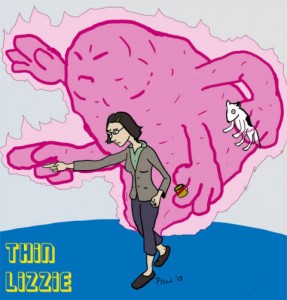 Well, it’s simple… since I work for a university, I recently became eligible for free tuition for grad-level classes, so a couple of months ago I started a master’s program in software. Which I’m sure will pay off in the long run, but in the short term it’s kind of meant tossing a hand grenade into my life as I knew it. Work on EYEBALL continues, but at a drastically-reduced pace; I don’t know that I’ll finish more than 4 or 5 pages this semester (although then it’ll pick up over the summer, at least for a while).
Well, it’s simple… since I work for a university, I recently became eligible for free tuition for grad-level classes, so a couple of months ago I started a master’s program in software. Which I’m sure will pay off in the long run, but in the short term it’s kind of meant tossing a hand grenade into my life as I knew it. Work on EYEBALL continues, but at a drastically-reduced pace; I don’t know that I’ll finish more than 4 or 5 pages this semester (although then it’ll pick up over the summer, at least for a while).
Stuff’s still happening, though. Before the coursework shit really started hitting the fan, I had time to work something up for Andrew Weiss’ Ultimate Powers Jam, and I’m actually happier with it than I am with pretty much any creative thing I’ve done for the past year. So there’s that.
In the meantime, yeah. I’m still around, and still working on comics at a snail’s pace. When I’m not fighting with Python.
History Is Hilarious – The Ol’ Fez Switcheroo
 I’m about halfway through Barbara Tuchman’s exceedingly excellent The Guns of August; World War I had always been a gap in my 20th century history, and I’ve always heard good things about the book. I’m really happy to say that it justifies the hype. It’s fascinating and – weirdly – hilarious. The more I read, the stronger my impression that Europe in 1914 was under the collective rule of one of the biggest gang of boobs in history, and that if World War I didn’t have such a horrible body count associated with it, it would rank as one of the great comedic acts of mankind.
I’m about halfway through Barbara Tuchman’s exceedingly excellent The Guns of August; World War I had always been a gap in my 20th century history, and I’ve always heard good things about the book. I’m really happy to say that it justifies the hype. It’s fascinating and – weirdly – hilarious. The more I read, the stronger my impression that Europe in 1914 was under the collective rule of one of the biggest gang of boobs in history, and that if World War I didn’t have such a horrible body count associated with it, it would rank as one of the great comedic acts of mankind.
Consider the case of the German battleship Goeben and her companion, the cruiser Breslau.
At the outbreak of hostilities in 1914, Goeben and Breslau were stationed in the Mediterranean. Shit hits the fan. War breaks out. Because of a network of pacts, you abruptly have a situation where noted world powerhouse Serbia is allied with Russia who’s allied with France who’s allied with England, opposing Austria-Hungary and their allies the Germans. The Ottoman Empire is neutral as things start out. They don’t like the Russians much, but they have a longstanding relationship with England, and there are a lot of German sympathizers in the Turkish military. They could go either way. And they’re strategically important, since all of the good warm-water ports supplying Russia depend on shipping traffic through the Dardanelles.
So. The Ottomans, a crucial swing state that could go either way. What do the British do to win them over? They seize a couple of completed battleships that they’d been building for the Ottomans. Ace diplomacy there.
Continue reading History Is Hilarious – The Ol’ Fez Switcheroo
The Awesome Boys: Sub Cauda EP
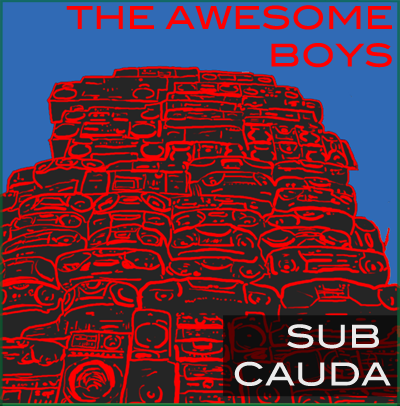 So, yeah. After working on it for most of 2012, I’ve finished and put out an EP on behalf of my fictional band, the Awesome Boys. It’s pretty good stuff, I think; if nothing else, it’s a good approximation of what the inside of my head sounds like, processed into something catchy and entertaining.
So, yeah. After working on it for most of 2012, I’ve finished and put out an EP on behalf of my fictional band, the Awesome Boys. It’s pretty good stuff, I think; if nothing else, it’s a good approximation of what the inside of my head sounds like, processed into something catchy and entertaining.
In an email to a local rock writer, I described the album thusly:
It’s always hard to come up with a description of your own music, but I guess I’d call Sub Cauda “ambitious garage rock.” There’s a lot of guitar and weird noises coaxed out of a Kaossilator. You could maybe say it’s music that draws equally from the Flaming Lips and Guided By Voices. Or probably not. But that’s a start, I guess.
That’s probably as good of a description as I can do. Anyway, go check it out! The whole thing is free to stream or download on my Awesome Boys site; or if you prefer SoundCloud, 5 of the 6 songs (minus a pretty rad Bowie cover) are streaming over there.
David Bowie: Speed of Life
Today’s great music: the opening track of Bowie’s best album, where he and Brian Eno bring some sounds back from the future.
Cab Calloway: Who’s Yehoodi?
Today’s great music: this song makes absolutely zero sense, but it’s a riot anyway.
Jack White: Love Is Blindness
Today’s great music: I’m pretty tired of U2 at this point, but Jack White injects a hell of a lot of life into this one. I actually remember “Love Is Blindness” being a lot better when U2 was doing it live than on the album, because they’d let the Edge off his chain for a few minutes of anarchy at the end.
Louis Armstrong: Mack the Knife
Today’s great music: Louis Armstrong being suave as hell singing “Mack the Knife.” Check out the scar tissue on his upper lip from his unorthodox trumpet technique.
The Buzzcocks: What Do I Get?
So, we’re going to try something here: For the next month or so, I’ll use this space to curate some great music. Because after working in art museums for 10 years, I have curation envy. Today’s entry: a live version of the Buzzcocks’ asskicker “What Do I Get?”
Reviews You Would Not Want to See After Renting Out Your Apartment on AirBnB.com
 Steve: The place was great! Spacious and sunny, just like the listing said. And the location couldn’t be beat! My wife and I were also really impressed with the strength of the bedframe, and the decorative headboard offers a very convenient number of latch-point options for restraints. Highly recommended.
Steve: The place was great! Spacious and sunny, just like the listing said. And the location couldn’t be beat! My wife and I were also really impressed with the strength of the bedframe, and the decorative headboard offers a very convenient number of latch-point options for restraints. Highly recommended.
Emily: It was nice to stay in a place with a full kitchen and easy subway access. The garbage disposal really goes above and beyond the call of duty. But most of all, we appreciated the way the locks and doors took a lot of abuse but stood strong! Also, police response in the neighborhood was superb.
Luther: The living room was in fact as large as it looks in the pictures in the listing. Easily offered plenty of room for both a hardcore band and a mosh pit. The band’s equipment tested the apartment’s electrical system, but fortunately the building’s breaker box is easily accessible and no problem to bypass. GREAT PLACE! Would totally stay there again!
Annie Q: Before we showed up, I was totally worried about being kept up by noise from the street, and by the logistics of getting the keys to the place. But none of those wound up being a problem, and the apartment was fantastic. My only complaint was with the bathroom- the bathtub was a little small, and it was a real stretch to fit 3 of us in there. But we managed… the bubbly sure helped! 😉
Mike: Boy, their cat was a real trouper.
An Ancient Comic: Pacmania
Receding Wave
New project, page 1
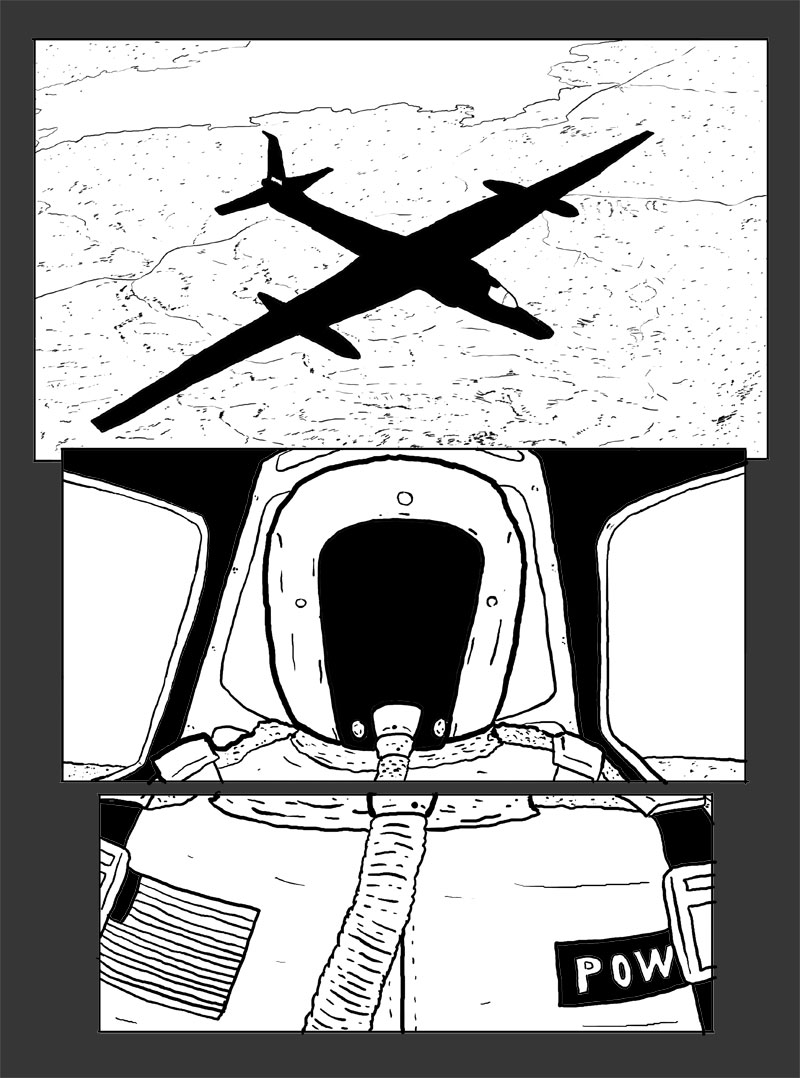 So, here’s what I’ve been working on. This is the inked (but not colored or lettered) first page of a graphic novel I’m setting out on. This should be a pretty big project, and I’m actually not sure what my endgame will be as far as getting it out into the world- I want to have a big chunk of pages put together before I start thinking about whether or not to run it serially online, for instance.
So, here’s what I’ve been working on. This is the inked (but not colored or lettered) first page of a graphic novel I’m setting out on. This should be a pretty big project, and I’m actually not sure what my endgame will be as far as getting it out into the world- I want to have a big chunk of pages put together before I start thinking about whether or not to run it serially online, for instance.
The project is (temporarily) called Eyeball, and it’s about spyplanes in the early 60s. Or about not getting too lost in your job, depending on which way you want to look at it.
This one’s been gestating for quite a while; I wrote out the original plot and started scripting in 2006. I was really excited about the project, but eventually bailed because 1) I didn’t think I could draw well enough to do it justice, and 2) the thought of doing all of the visual research to get the look and feel right for a story set in 1960 just scared the piss out of me. But now I’m 6 years better at drawing (I still think it’ll be a challenge, but it’s actually possible this time) and, well, Mad Men has gone and done me the favor of researching what things looked like in 1960.
So we’ll see where this goes.
